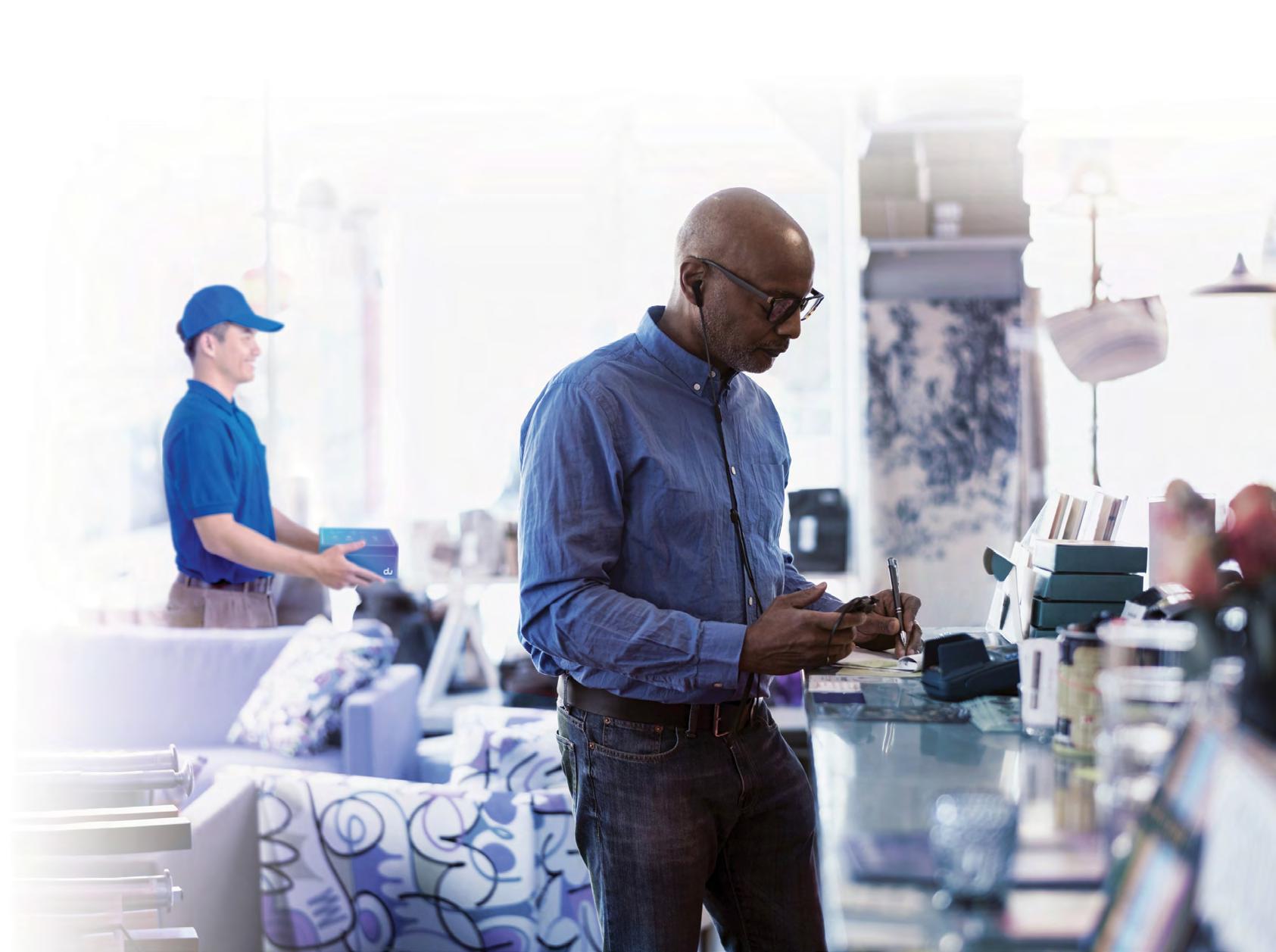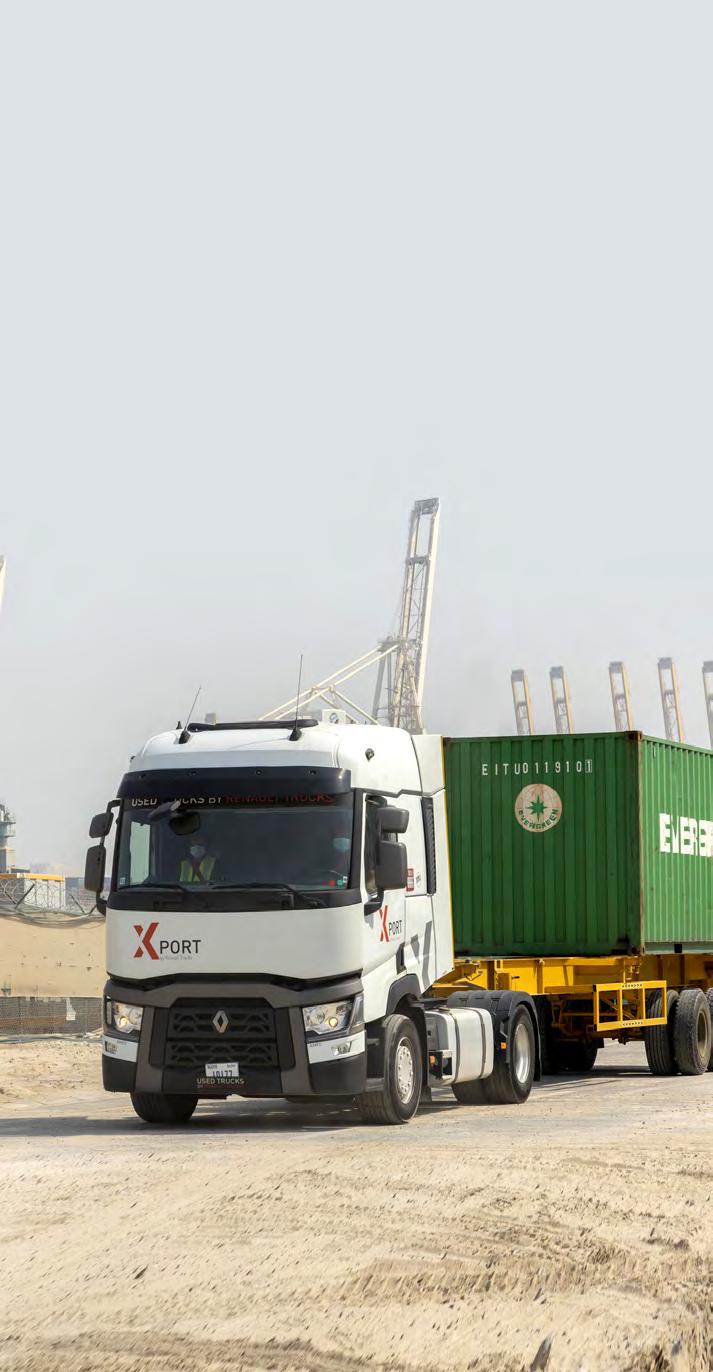PORTS
Positive outlook for UAE ports post-Covid
CARGO
COVID19- Vaccines Arrive to Dubai
CONNECTING TRADE PROFESSIONALS WITH INDUSTRY INTELLIGENCE

PORTS
Positive outlook for UAE ports post-Covid
CARGO
COVID19- Vaccines Arrive to Dubai
CONNECTING TRADE PROFESSIONALS WITH INDUSTRY INTELLIGENCE
LEADING INDUSTRY PLAYERS DISCUSS CHANGES THEY FORSEE FOR THE YEAR TO COME
SUSTAINABLE TRANSPORT Improve Urban Air Quality
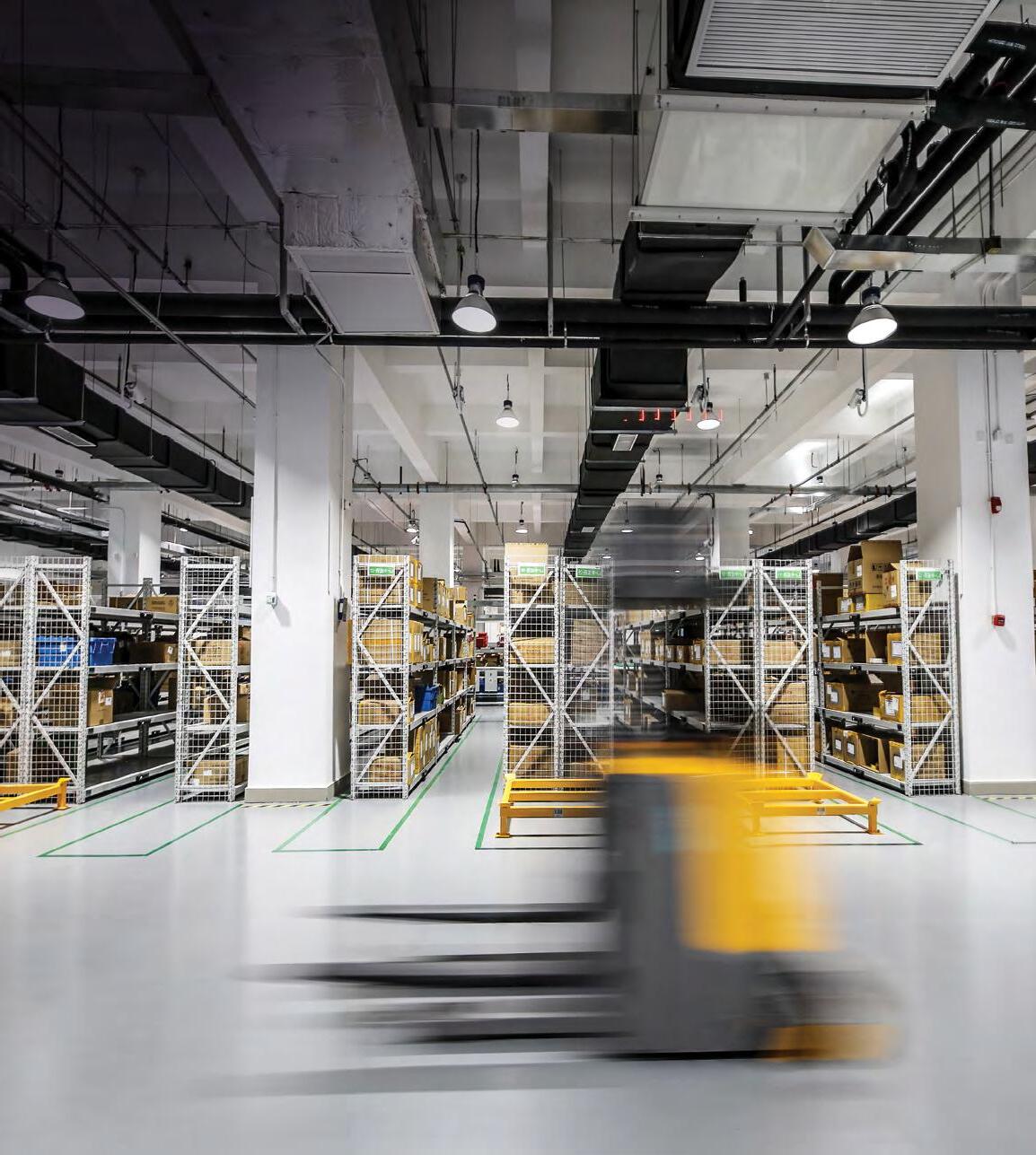
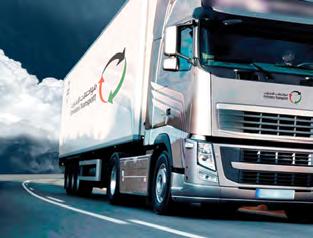
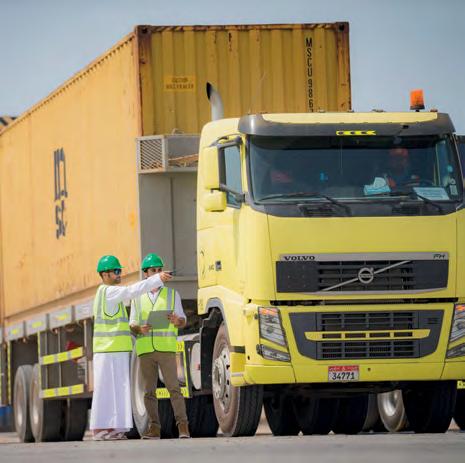





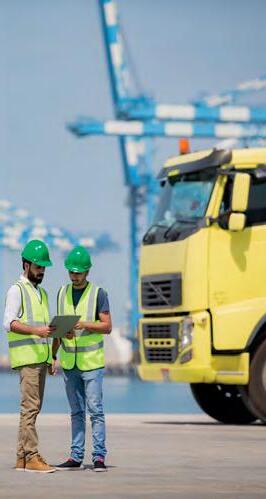












20

COVER STORY
Logistics News ME caught up with some of the leading players in the logistics industry to discuss what changes they forsee in 2021:
Saud Abu Alshawareb Managing Director of Dubai Industrial City for Logistics Middle East
Eugene Mayne Group CEO, Tristar Group
Deepak Khushalani Founder & MD, Premier Logistics Dubai (UAE)

24

18 PORTS
POSITIVE OUTLOOK FOR UAE PORTS POST-COVID Container activity in UAE ports is booming. Tankers are showing signs of recovery
24 CARGO
COVID-19 VACCINES
ARRIVE TO DUBAI
Emirates SkyCargo transports first batch of Pfizer-BioNTech COVID-19 vaccines for Dubai Health Authority
26 MARINE AZRAQ
On the front lines of ocean conservation in the UAE
28 TRUCKS
FUSO CANTER EURO 5
Al Habtoor Motors and Daimler Commercial Vehicles
MENA launch the new FUSO Canter Euro 5
30 SUSTAINABLE TRANSPORT IMPROVE URBAN AIR QUALITY
Ford research reveals how emerging technologies such as dynamic geofencing and blockchain can combine with hybrid-electric vehicles to help improve air quality in cities
34 WEBINARS
FUTURE OF UAE LOGISTICS SECTOR
Organised by Dubai Chamber, 360 Dialogue Series sheds light on key trends and technologies reshaping supply chains during Covid-19

business continuity is our top priority. Our initiatives and remote solutions have got you covered in all situations.
du.ae/wegotyourb


Hassan Al Mansouri, Under-Secretary of the Ministry of Energy and Infrastructure for Infrastructure and Transport Affairs, said, “Due to the policy of the UAE related to achieving global leadership in all areas of development, economic diversity and sustainability, significant attention was given to the logistical efforts to organise land,
maritime and railway transportation, as well as to drafting relevant legislation.”
“The Ministry of Energy and Infrastructure is the authority responsible for the country’s logistics performance index and is keen to improve logistical services, as one of the key foundations of comprehensive economic development and the main driver of the UAE’s strategic logistical objectives that include increasing the contribution of the logistics sector to raising the GDP, increasing the share of Emirati goods entering the region, maximising job opportunities provided by the sector, improving the country’s ranking in international logistics and industrial indexes, and enhancing the country’s global reputation in this area,” he added. Abdullah Al Saadi, Head of the Logistics Performance Executive Team in the UAE, pointed out that the team, headed by the Ministry of Energy and Infrastructure, has introduced, in cooperation with the Federal Customs Authority, a unified customs e-system and a shipment e-tracking project, which reduced the timeframe for clearing shipments and customs clearance procedures and ensured the happiness of customers.
Kasun Illankoon Deputy Editor kasun@bncpublishing.net


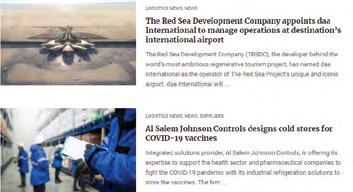
CEO Wissam Younane wissam@bncpublishing.net
DIRECTOR
Rabih Najm rabih@bncpublishing.net
GROUP PUBLISHING DIRECTOR
Joaquim D'Costa jo@bncpublishing.net
+971 50 440 2706
BUSINESS DEVELOPMENT DIRECTOR
Rabih Naderi rabih.naderi@bncpublishing.net
+966 50 328 9818
DEPUTY EDITOR
Kasun Illankoon kasun@bncpublishing.net
EDITORIAL DESIGN Christian Harb chrisoharb@gmail.com
MARKETING EXECUTIVE Aaron Sinanbam aj@bncpublishing.net
SUBSCRIBE
subscriptions@bncpublishing.net
Dubai, United Arab Emirates P +971 4 4200 506 | F +971 4 4200 196
For all commercial enquiries, contact sales@bncpublishing.net
T +971 50 440 2706 PO Box 502511
All rights reserved © 2021. Opinions expressed are solely those of the contributors.
Logistics News ME and all subsidiary publications in the MENA region are officially licensed exclusively to BNC Publishing in the MENA region by Logistics News ME. No part of this magazine may be reproduced or transmitted in any form or by any means without written permission of the publisher.
Images used in Logistics News ME are credited when necessary. Attributed use of copyrighted images with permission. All images not credited courtesy Shutterstock.
Printed by UPP
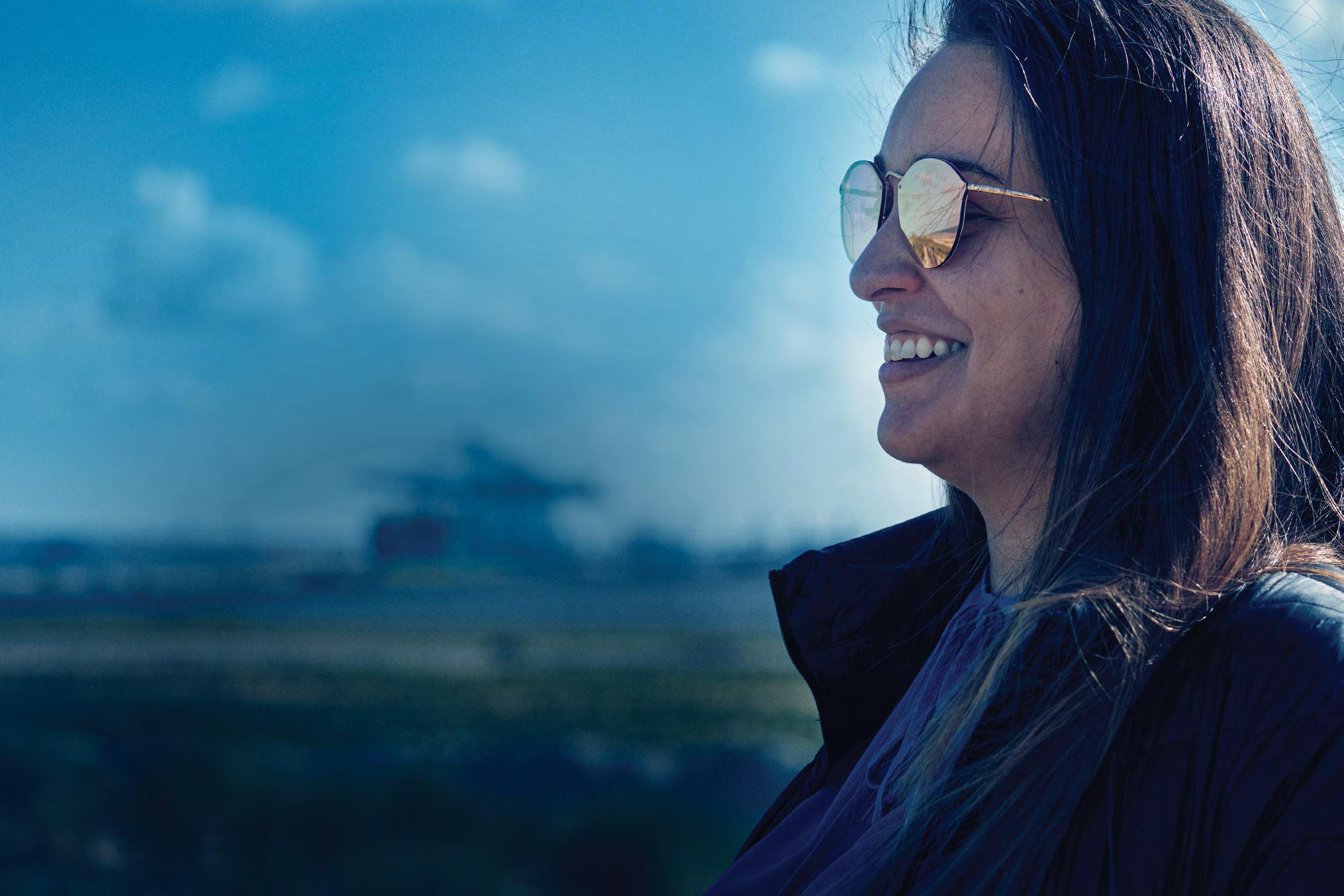



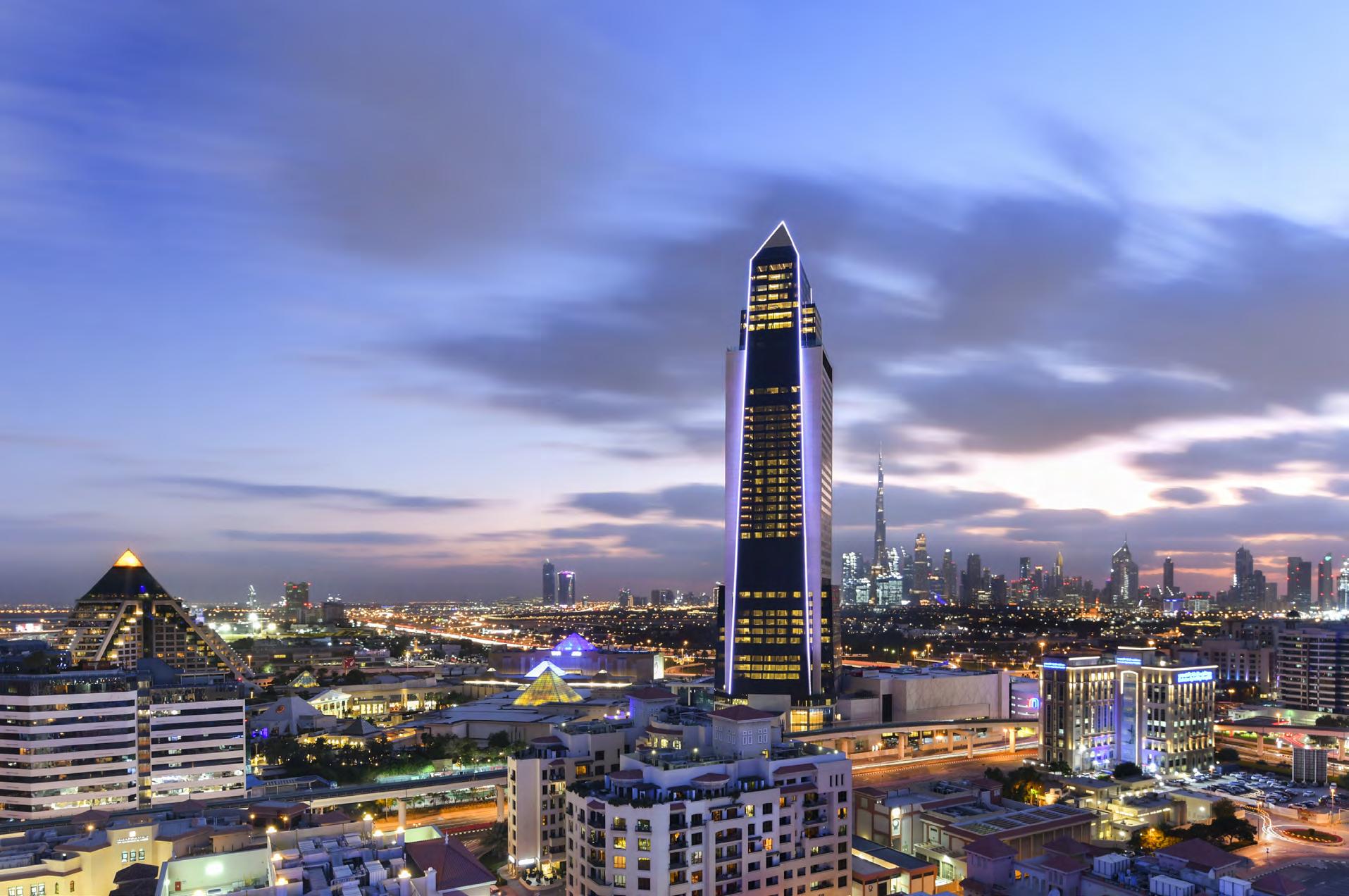
You may have already met at dinner time. Perhaps you saw them delivering something awesome to your neighbour.
One thing is for sure: Every day you’ll see and meet more and more of our delivery specialists in red, ready to put a smile on your face with fast, reliable, and safe deliveries.


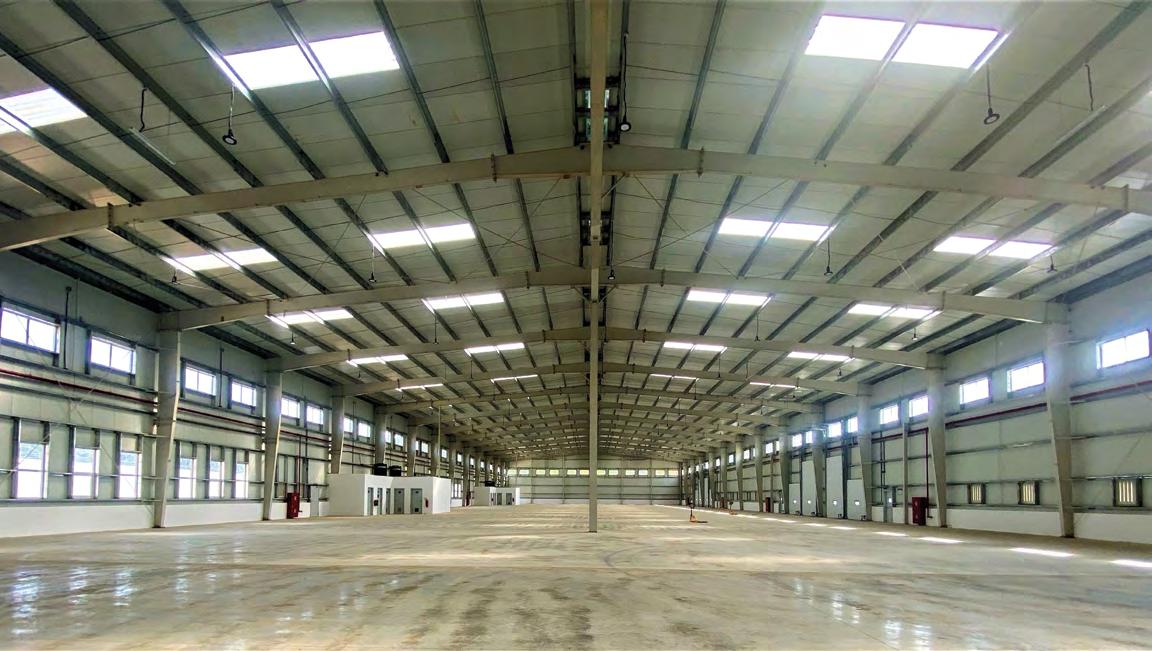
Maersk has chosen the new Agility warehouse project in Abidjan to house its new storage, deconsolidation and distribution facility in the economic capital of Cote D’Ivoire.
The newly opened 5,000 SQM facility is designed to handle 3,900 pallet positions and meet the end-to-end requirements of Maersk’s global customers, including those in Retail, Fast Moving Consumer Goods, and Technology. Thomas Theeuwes, Maersk Central West Africa Managing Director, said: “Maersk has a strong presence in the West Africa market, and we are continuously reviewing our value proposition to ensure we offer competitive end-toend solutions. The Agility warehouses
provide the standard of infrastructure that enables Maersk to offer a consistent experience for both global and local customers, assuring them the same reliable service, security and safety being provided in this facility is on a par with what customers experience in Maersk facilities within Europe and North America.”
The Agility warehouses are located on the main highway from Abidjan to Yamoussoukro, which leads to neighboring Mali and is strategically situated adjacent to the new PK24 industrial zone of Abidjan.
Agility is funding and developing 250,000 SQM of warehousing on the site in what will become a center of excellence for warehousing in the re -
gion to support businesses operating in and from Cote D’Ivoire. The Agility warehouses provide the essential infrastructure required for both multinational companies and local businesses in the storage, distribution, packaging, processing and light manufacturing sectors.
Geoffrey White, CEO Agility Africa, said: “We are delighted that Maersk decided to lease warehouse space in the new Agility facility in Abidjan. Agility is funding and developing a network of warehouse parks across Africa to enable companies to rapidly and easily enter or expand in the African market. Agility provides warehouses that are move-in ready, enabling fast deployment, flexibility and reduced capital commitments for our customers. The provision of secure, ready-built, quality, warehouses with consistent power and IT connectivity in the Abidjan market is a true enabler of growth and prosperity in Cote D’Ivoire.”
Red Sea Gateway Terminal (RSGT), has been named winner of the 2020 Sustainability Award at the 17th Annual Seatrade Maritime Awards, Middle East, Indian Subcontinent & Africa, hosted virtually from Dubai. RSGT was selected in recognition of “the exceptional initiative that supports sustainable maritime commerce”” by the judging panel of independent industry experts.
“We are very proud to have been selected by our peers for this award,” stated RSGT CEO Jens Floe, who added: “We remain dedicated to pursuing environmentally sustainable operations at Saudi ‘Arabia’s largest container terminal, through our CSR program, constant investment in new, low emission and efficient equipment, procedures, and the extensive training of our personnel.” RSGT is currently commissioning two new latest-generation electric-powered STS cranes and 10 new technologically advanced hybrid-Rubber-Tyred Gantry cranes (RTGs) delivered in November, into the i’ ‘facility’s container handling operations. The use of electric cranes eliminates emissions of CO2 and other greenhouse gases resulting from
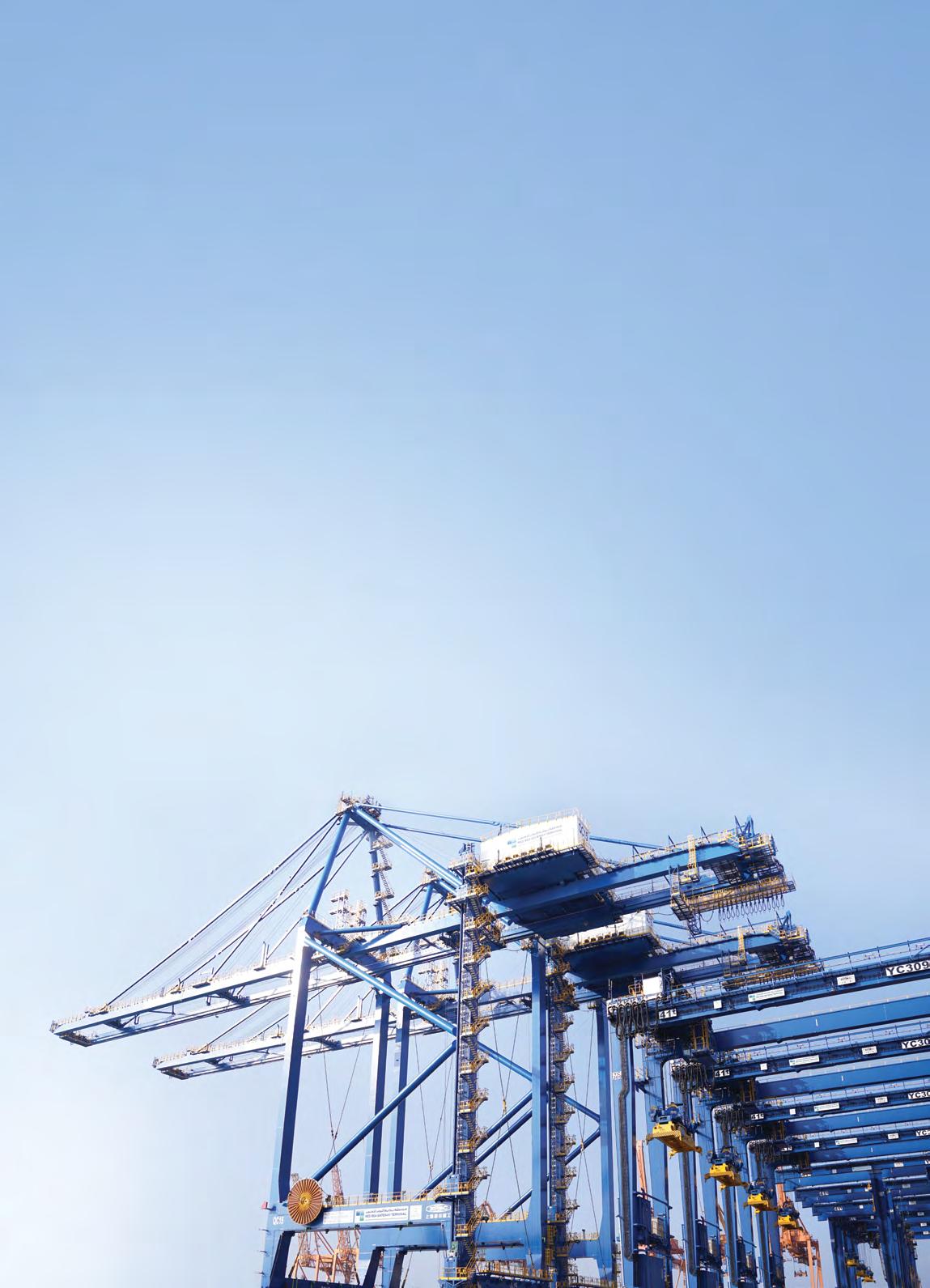
diesel-powered cranes; the hybrid-RTGs switch from diesel to battery power depending upon usage needs, also reducing diesel-related emissions, while improving fuel efficiency.
RSGT has also established artificial reefs just outside the port area in support of biodiversity and marine life.
Over the 30-year term of the concession agreement signed last year with the Saudi Ports Authority (Mawani), RSGT will be investing USD 1.7 billion in new terminal infrastructure and equipment to improve operational efficiencies and reduce greenhouse gases and other emissions, as the terminal expands annual container throughput capacity to 8.8 million TEU. RSGT incorporates programs and training in support of sustainable terminal and port operations, and environmentallyconscious conservation planning, reflecting a core philosophy of the ‘company’s business model. “Our commitment to sustainability and protection of the environment and natural resources of the Red Sea Region is shared by all of our staff, and is a guiding principal in our daily operations, as well as our long-term strategic planning,” noted Jens Floe.
Ajman Free Zone has announced the 73 per cent completion of its ongoing Eco-Friendly Zone project a few months after its Chairman, H.H. Sheikh Ahmed bin Humaid Al Nuaimi, formally launched the large-scale initiative.
The construction of the green zone, which will comprise new sustainable warehouses as its core feature, is going full speed ahead alongside Ajman Free Zone’s heightened and steady efforts to attract more local, regional and global investors. Attracting global businesses to the emirate is aligned with the goals of Ajman Vision 2021. The project is being positioned to support the free zone’s efforts to provide investors with
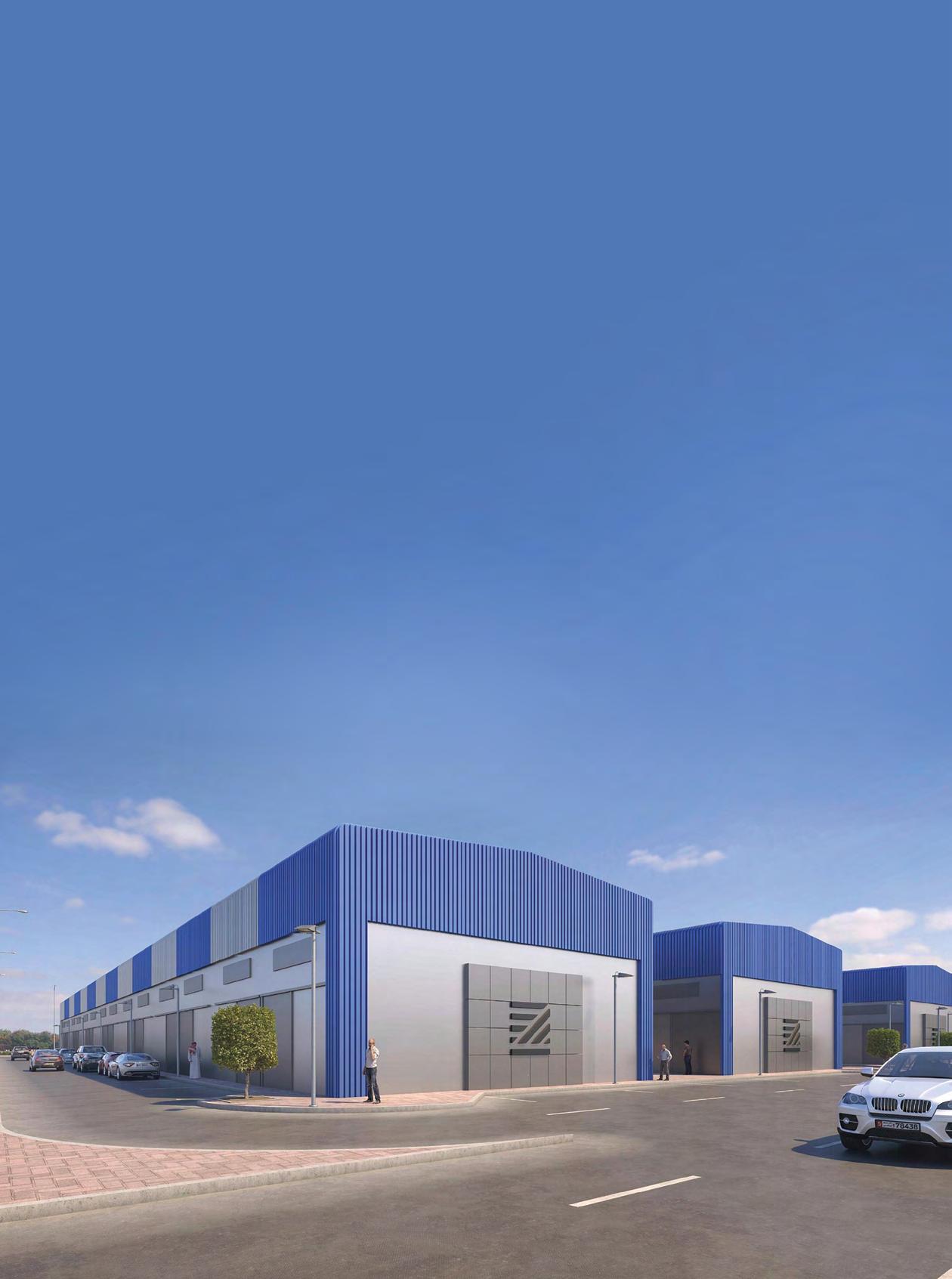
new additional units that meet the demand and requirements for spaces like showrooms, warehouses, and sustainable industrial facilities.
H.E. Eng. Ali Abdulla Bin Towaih AlSuwaidi, Director General, AFZ, said:
“We remain on track to complete the project by February 2021. This will not only help further expand the free zone’s capacity to fully support commercial and industrial activities, but it will also increase its competitiveness in a world that is steadily marching towards a sustainable future. The AED 36-million green initiative also serves to demonstrate our commitment to boosting Ajman’s transition to a green economy, as well as promoting environmental pro-
tection and increasing the market share of clean energy in the country according to the goals of UAE Vision 2021.”
Unveiled in July 2020, the strategic 9,070-square-meter Eco-Friendly Zone will rise to become the free zone’s green business community of stateof-the-art warehouses and offices and service blocks built to meet the various requirements of companies across industries. Each warehousing unit will be equipped with advanced tools designed to reduce electricity consumption, minimize carbon emission and allow the implementation of the best sustainable practices as part of Ajman Free Zone’s overall environmental sustainability initiatives.
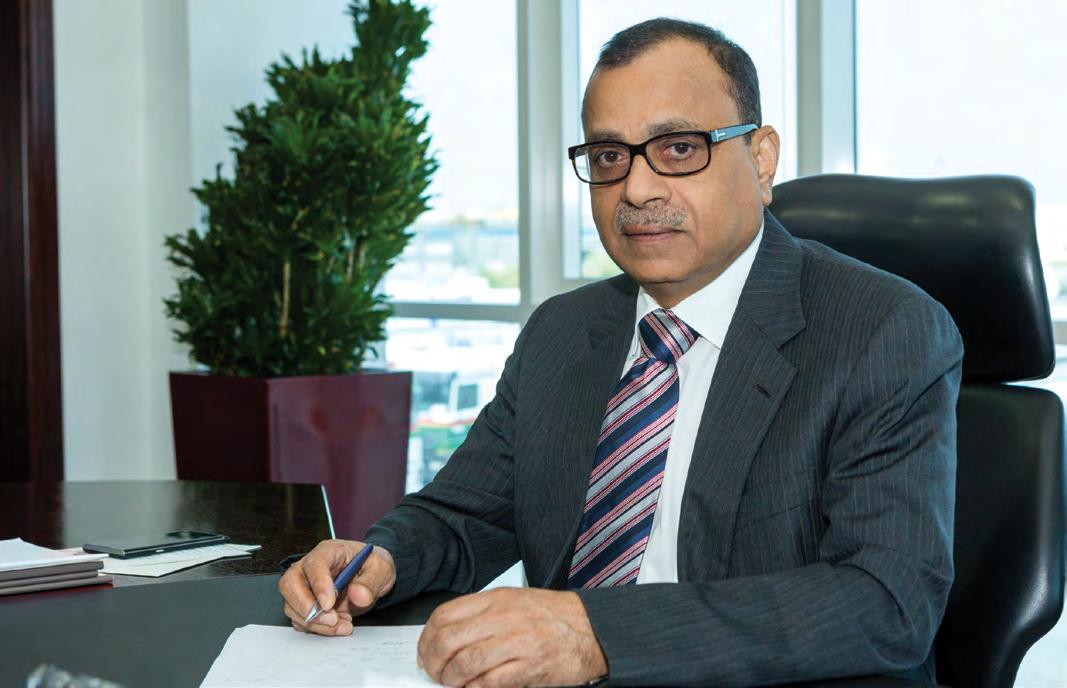
Tristar Group, the global integrated energy logistics company, announced that it has won a five-year contract, valued at US$8 million, with Linde Global Helium. Playing a key role in Linde Global Helium’s supply chain, Tristar will provide transport for Linde’s helium cargo across the GCC.
Tristar will utilise its specially designed fleet which has advanced built-in safety features, to ensure the safe transport and delivery of Linde’s cryogenic containers. Furthermore, the cargo will be transported by Tristar’s professional drivers, who are all accredited and qualified in the handling of hazardous products including cryogenic gases at extremely low temperatures.
Eugene Mayne, Group CEO of Tristar said: “We are delighted to have signed this
contract with our long-standing customer, Linde Global Helium. Whilst this is most certainly a major win for us, we’re even more honored to continue working with Linde as they share in Tristar’s values and hold the same standards when it comes to health and safety.
At Tristar, we operate with the highest level of safety practices, and this has always been recognised and celebrated by our customers. In 2018, we received the Linde Global Helium Award for our outstanding safety performance by achieving eight million accident-free kilometers for the transport of helium containers in the GCC, which serves as testament to the ongoing recognition we receive from the team at Linde. We look forward to continuing this partnership and further delivering
on our proven excellence in operations, health and safety.”
Kurt Richter, Head of Helium Supply Chain Management at Linde, said: “Helium is a globally traded gas. We pride ourselves on having a robust supply chain, with a diverse portfolio of sources, the largest fleet of cryogenic Bulk Helium containers in the world, and a state-of-the-art facility in Dubai for the staging and maintenance of our global fleet. With Tristar, we have a reliable partner who supports us in ensuring the supply of our global helium customers safely and on time, wherever they are.”
Tristar has been providing transportation services to Linde Global since 2006 across the GCC. Earlier this year, Tristar Group’s joint venture in Saudi Arabia, United Stars, signed a five-year contract with LindeSigas, to transport industrial and medical gases to Linde-Sigas clients across the Kingdom from five centrally located depots in Dammam, Jeddah, Riyadh, Jubail, and Yanbu.
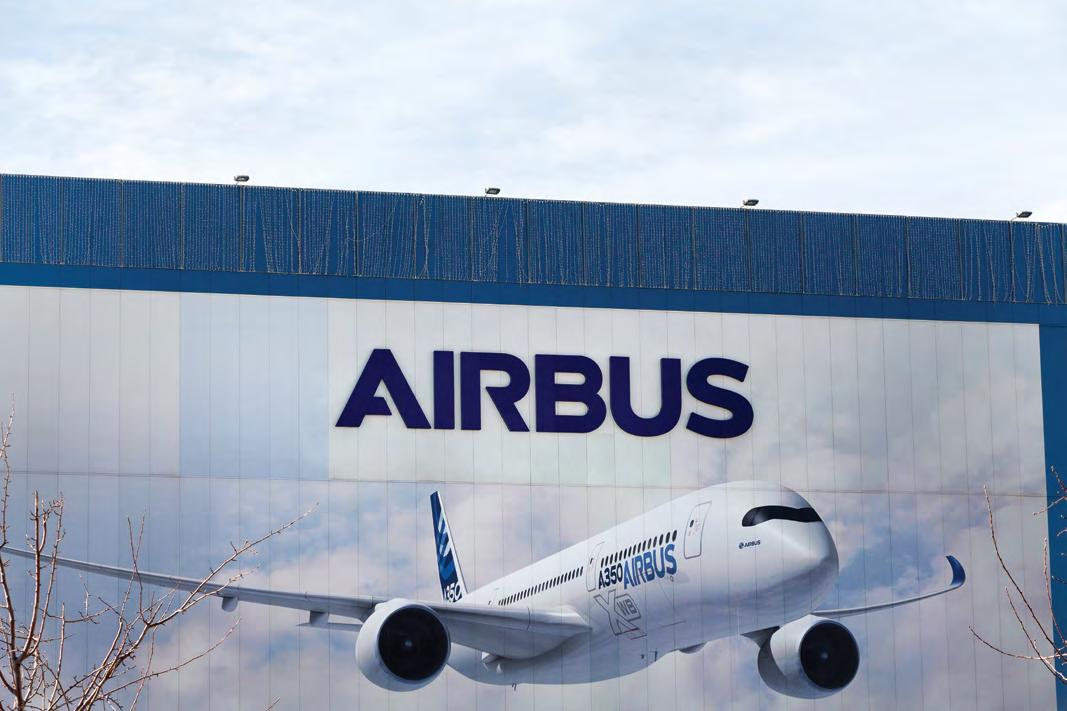
As part of the Axelia project to transform the RN79 national road into a motorway between the cities of Sazeret (03), and Digoin (71), Aliaé (a subsidiary of the Eiffage Group) has entrusted the operation of the infrastructure to the Paris Rhine Rhône Motorway Group (APRR). It was in this context that APRR sought Airbus’ expertise to provide a critical communications solution in order to extend the current Airbus Tetra network implemented, over the roadwork area to ensure the safety of the users, and staff.
As part of the Axelia project, Airbus and its partner Altech are to deploy a mission-critical push-to-talk (MCPTT) communications solution to ensure secure communications between patrollers and
maintenance employees working on this 90 kilometer-long road.
While the roadworks are ongoing, and until the permanent Tetra network is implemented as soon as the new motorway opens, Airbus is to provide its Tactilon Agnet collaboration platform, as well as Tactilon Dabat hybrid terminals. These will allow access to push-to-talk (PTT) features, and emergency calls using an LTE network.
“We are honored that APRR is renewing its confidence in us by opting for the Tactilon Agnet collaborative platform. This project shows the complementarity of group communication services based on 4G technologies on the one hand, and radio technologies on the other. Our portfolio of Tactilon solutions and services fully meets this need and provides high flexibility and
interoperability” explains Thierry Becker, Vice President of the Western Europe- and Africa regions for Secure Land Communications at Airbus.
Thanks to the use of Tactilon Agnet, the teams in charge of the operation and safety of the workers will now have access to communication equipment and technology adapted to their needs, whether they are using the existing APRR Tetra network, or LTE, with a single hybrid and interoperable terminal. This allows smooth operations to continue until the new Tetra network is in operation in this area, thanks to our technology.
Since 2003, APRR has been using Airbus’ Tetra network. This network covers more than 2,300 kilometres of motorway lanes. Since the network’s implementation, Airbus has been working hand-in-hand with its partner Altech in supplying the network and infrastructure for APRR.
For this project, Altech is in charge of the deployment and customer training on the full package.
Amana Solar, a UAE-based sustainable energy provider for businesses, has successfully implemented a 3,515 kWp rooftop solar installation at Trilogi’s Mega Distribution Center (DC) warehouse in Jebel Ali Freezone, which enables the growing logistics business to swiftly switch to clean energy while significantly reducing its energy costs by around AED2.45 million in the first year of operation.
Today Trilogi is a rapidly-expanding logistics arm of Gulf Marketing Group (GMG), operating across the UAE and GCC region and offering air, sea, and land freight solutions. The latest solar installation will offset more than 80% of Trilogi’s power consumption at the warehouse, lower their operating costs, and reduce carbon emission by around 70,000 tons
during its lifetime, which is equivalent to removing 15,000 vehicles off the road and consuming 159,000 barrels of oil.
While the construction of the 68,000 sqm Trilogi facility—consisting of six interconnected angled roofs—was underway, Trilogi and Amana Solar saw an opportunity to take the warehouse into a more sustainable future with an ideal landscape for hosting a solar power system. Amana Solar completed the project within three months following the construction of Trilogi’s warehouse.
Riad Bsaibes, President & CEO of Amana Investments, said: “Our relationship with Trilogi over the years has been one that we are especially proud of, resulting in the construction of several of their facilities. We thank Trilogi for their trust in AMANA and we look forward to continuously sup-
porting and enabling their sustainability goals.”
Mohammad A. Baker, CEO of GMG, said: “Today Trilogi is a growth business, and as part of that expansion, we feel it is important to develop in a sustainable way that will provide long-term value to our business, our customers, and the communities in which we operate. Working with partners like Amana Solar not only enables us to leverage the very latest technologies and systems, but contribute to the UAE’s own renewable energy ecosystem.”
The rooftop solar plant is expected to generate around 5.5 GWh during its first year of operation by utilizing high-efficient Mono PERC modules and German string inverters which decentralizes the clean energy production and minimizes downtime losses.
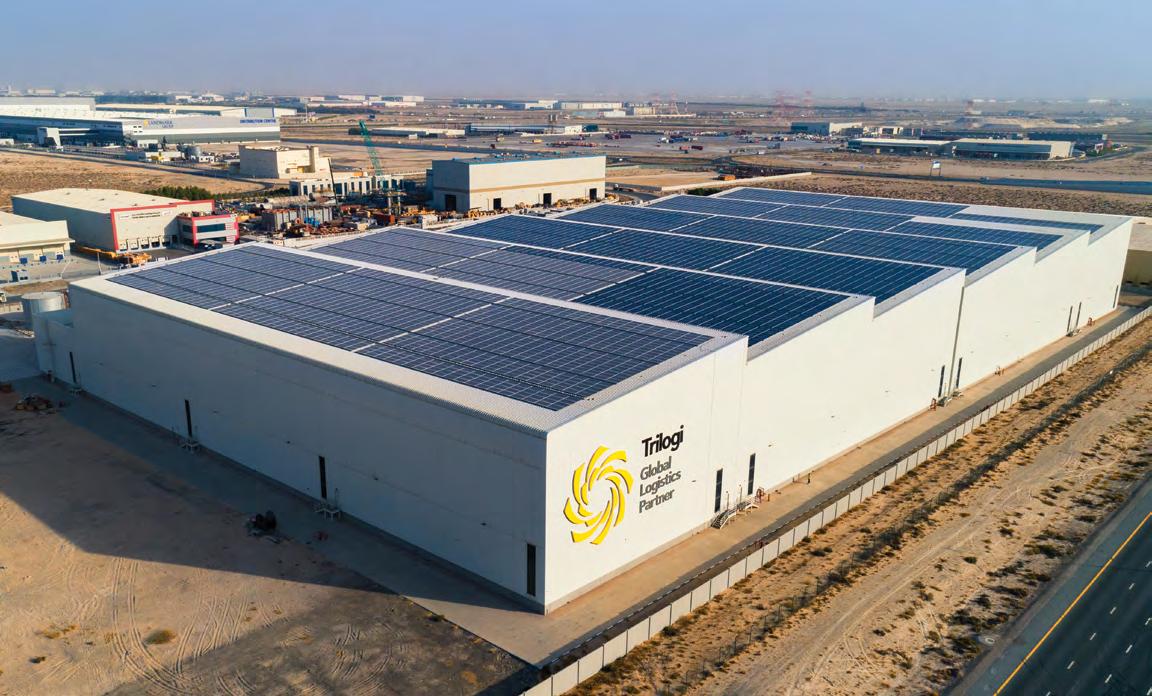
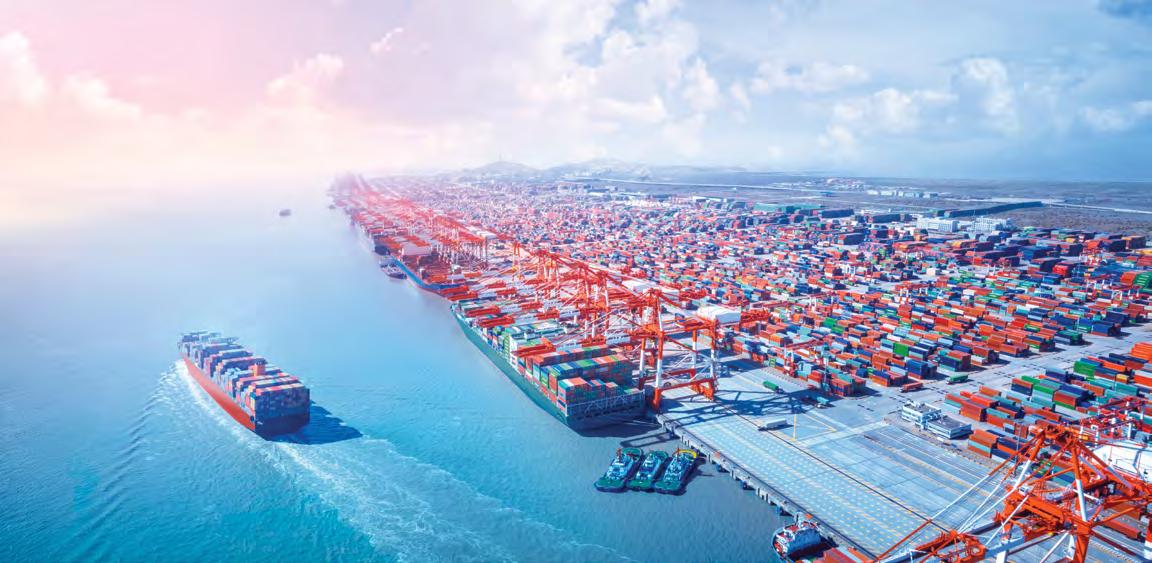
This article will use VesselsValue Trade data to assess how trade routes in and out of the UAE have grown over time, as well as assess the impact Covid-19 has had on specific ports across the Container and Tanker sectors. The UAE is home to some key international ports. With a strong focus on economic development, the country is reliant on these hubs to help drive growth and form vital trade connections with other countries. The UAE has a number of well-connected Container and Tanker ports, which serve the country with imports and facilitate ex-
ports, as well as transhipment within the Middle East Gulf region.
UAE Container Growth
As consumerisation and disposable income grows in the UAE, so do container imports. Despite the global Covid-19 pandemic, Container trade into the UAE has stayed above 2019 levels. The below chart shows a YoY view of total monthly cargo capacity for Handy Container up to ULCV size vessels, heading into the UAE from anywhere else in the world. Both years experienced a decline in containership capacity around January and
February in the New Year but picked up again into the summer months. Growth in capacity this year was less pronounced between February and May than last, likely the result of Covid-19 disruptions and lessening demand. However, containership capacity has stayed strong overall, reaching a high of 3,445,071 TEU in October, an impressive 15% increase on the same period last year. Some short-term volatility was seen in November as monthly capacity fell, but this overall growth suggests that consumer demand has stayed consistent in the UAE, despite the strains of the Covid-19 pandemic.
Using VesselsValue Port Analytics data, we will now take a closer look at Jebel Ali, one of the main transhipment ports in the UAE.

With 3517 journeys in total ending in the port over the last year, it received nearly triple the number of journeys compared to the UAE’s second top port, Khalifa. The most popular container types to enter Jebel Ali are Sub-Panamax and Post Panamax containers, completing journeys from countries in the East such as Singapore and Malaysia, but also interregional journeys between Oman and Saudi Arabia.

As shown on the chart, total capacity in January started slightly above last year but fell into February. It then stayed at just below 2,000,000 TEU until recovering promisingly into July this year, before exceeding levels seen this time last year by 11% in October. Overall, capacity has been consistently recovering since June this year, despite a decline seen more recently in November. This data suggests that the UAE’s top container port was impacted by Covid-19 at the beginning of the year, as many ports globally experienced reduced imports alongside record numbers of inactive containerships during this time. However, as demand recovered and port operations began to return to normal, Q3 saw a significant increase in total capacity on the route.
Despite the UAE diversifying into different markets to aid development, a large percentage of the countries GDP is still derived from oil production. This year to date, the UAE has exported nearly 197,000,000 MT of oil globally on large dirty tankers. However, this is down 7% in total compared to the same period last year, suggestive of the impact of Covid-19 on global oil demand. A significant proportion of UAE oil is exported from Fujairah port, located in the Gulf of Oman, followed by Zirku Island in the Persian Gulf. Fast emerging as an oil storage and shipping hub, Fujairah is no longer just a popular bunkering port. As uncertainties around transiting the Strait of Hormuz unfolded last summer due to the tanker

attacks, Fujairah was increasingly used to store and ship crude towards the end of last year due to its strategic location. This chart shows monthly estimated cargo miles leaving Fujairah in tankers (VLCC to Aframax), since the start of 2018.
A clear increase in cargo volumes leaving Fujairah can be seen since April 2019, as volumes begin to follow an upwards trajectory until peaking in December 2019 at 12,291,482 MT, 25% higher than in December 2018. However, into 2020, volumes plummeted by 31% to 8,518,318 MT. This shows the impact that Covid-19 had on oil demand in February, as refiners were slowing down and trading partners in the East entered lockdowns. The below table shows the top 3 receiving countries of dirty tankers from the UAE, by cargo miles, over the last year.
Exports declined even further into May this year, before improving temporarily in June, July and August. The future of exports from Fujairah depends heavily on how the world recovers from Covid-19 and how quickly demand returns to normal. Also, many ports and countries are still working their way through surplus oil stored from the oil glut experienced in late March this year, pushing many vessels into floating storage. If a vaccine is proven successful, global oil demand could increase rapidly as people return to normal activities, and Fujairah is likely to continue with growth in tanker exports as experienced in 2019.
Overall, Container trade within the UAE has not faltered as significantly as other countries and has experienced good overall growth, especially when compared to figures last year. This suggests that the investment the UAE has made in recent years to improving port infrastructure has proven beneficial, especially amid the pandemic where human workforces were compromised, and technology proved vital.
Conversely, oil exports overall from the country have suffered, with levels this year to date not quite reaching highs seen in 2019. However, a Covid-19 vaccine is a good sign for UAE tanker exports, and it is expected that recovering demand in 2021 will bring tanker exports back close to where they were last year.
n 2020, Covid-19 rattled businesses and supply chains, and changed consumer behaviour. Now there is a new urgency to fill the gaps that the pandemic exposed, minimize risk, build resilience and connect more deeply with customers. Different logistics subsectors have recovered from previous crises within 12 months take for example the FMCG, healthcare, and road freight segments. FMCG and healthcare are among the major industries facing prominent logistics challenges. Most consumers are experiencing the fear of limited availability of fast-moving consumer goods as well as healthcare goods such as disinfectants. Most countries are experiencing supply pressure due to panic buying by consumers amid COVID-19 impact. As a result, FMCG companies are continuously tracking the current situation and are coming up with new strategies to ensure continued supply.
The agriculture sector has been exempted from the restrictions laid by the countries. This has ensured sufficient supplies of food and other daily needs products. E-groceries continue to meet the increasing
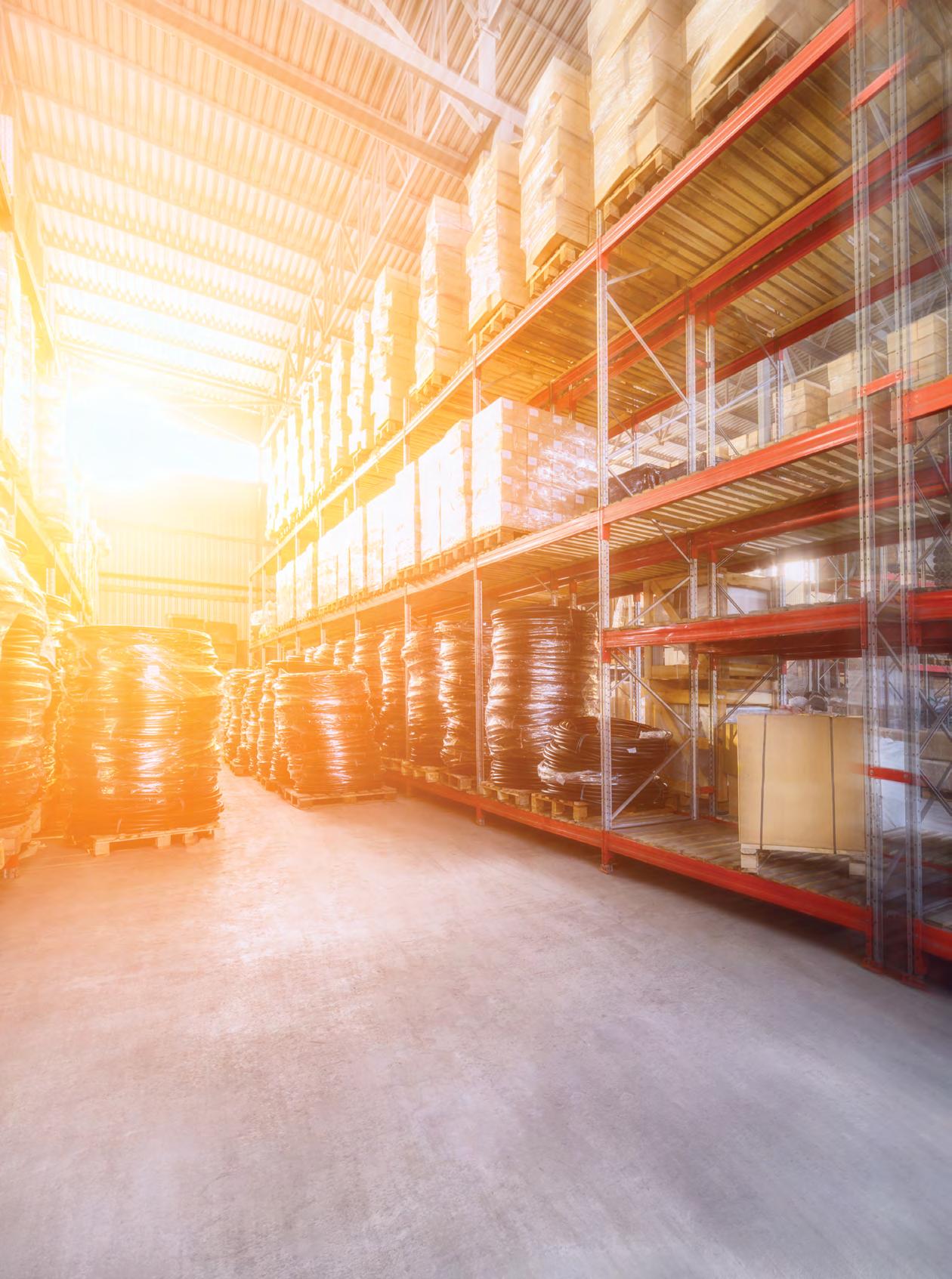
demand for daily supplies by the consumers. Amid the COVID-19 pandemic, Walmart Grocery application hit all-time high downloads in the US. Roadways are relatively less affected by the COVID-19’s impact on the logistics sector when compared with airways and waterways. Trucking is seen as a critical mode of transport amid the pandemic. However, the primary concern faced by the road transport segment is driver shortage and ensuring the health safety of the available drivers as well as their infrastructure. Being the preferred mode of transport for essential goods, road transport is relied upon heavily for the continued supply of food, medicine, and other essential products.
Furthermore In 2021, more and more firms will be applying technology to optimally match demand with available supply within their supply lead times.
Companies with global demand supply matching (GDSM) technology will have the competitive advantage in 2021. When rapid shifts in demand and supply make historical forecasting impossible, the best strategy is to have an agile GDSM approach in place to continuously reallocate and optimize the use of resources and manufacturing capacity.
Logistics News ME caught up with some of the leading players in the logistics industry to discuss what changes they forsee in 2021.
MANAGING DIRECTOR, DUBAI INDUSTRIAL CITY FOR LOGISTICS MIDDLE EAST
“As is the case with other industries, the logistics and transportation sector has faced immense challenges following the worldwide supply chain disruption triggered by the COVID-19 pandemic. Despite the global economic headwinds, Dubai has demonstrated great resilience through continuing to invest in logistical infrastructure and new technology.
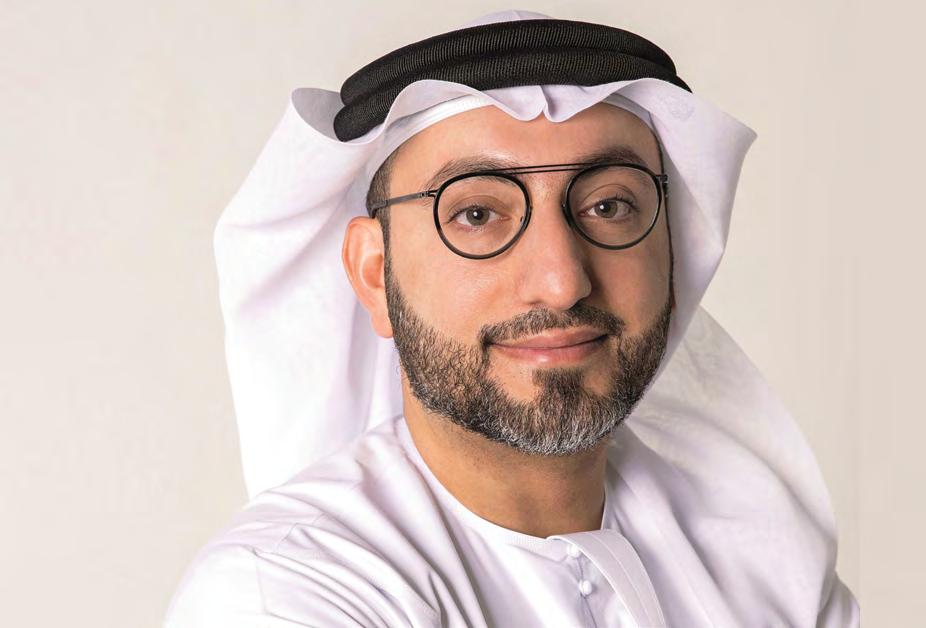
Going in to 2021, we anticipate a gradual recovery of the logistics and transportation sector though much uncertainty remains and expect several sub sectors such as food and beverage, medical supplies, mineral and chemical storage to expand. We also need to consider the vital role of the logistics sector in the global distribution and roll-out of the vaccines which will contribute to the overall recovery of the global economy. The anticipated outlook reiterates the UAE’s ongoing strategy of prioritising food security and monitoring strategic stocks of medicine and medical supplies throughout the year. In 2020, Dubai
Industrial City accelerated its investment plans through successfully implementing an AED410 million expansion of its business district and making several infrastructure improvements. The enhancements included two highway extensions to Emirates Road to enable heavy-tow trucks to directly access the major causeway linking Abu Dhabi with the Northern Emirates, Oman and Saudi Arabia. In addition, Dubai Industrial City also completed construction of a 14,000-bed worker accommodation village.
Over the next year, Dubai Industrial City will continue to focus on the government’s economic, environmental
“Going in to 2021, we anticipate a gradual recovery of the logistics and transportation sector though much uncertainty remains and expect several sub sectors such as food and beverage, medical supplies, mineral and chemical storage to expand.”
and food-related initiatives, aligned with the Dubai Industrial Strategy 2030, the UAE Energy Strategy 2050, and the National Food Security Strategy 2051. We hope to achieve key milestones through forging strategic partnerships, attracting inbound investments, and improving access for existing business partners at our industrial hub. For new entrants to the industry,
our goal will be to enhance ease of doing business and to enable them to access our integrated services as part of a comprehensive ecosystem. Another area of focus for us is to improve connectivity for our clients. We are strategically located between Dubai and Abu Dhabi, close to the regional borders and to Jebel Ali port, which has given our logistics partners a strategic advantage.”
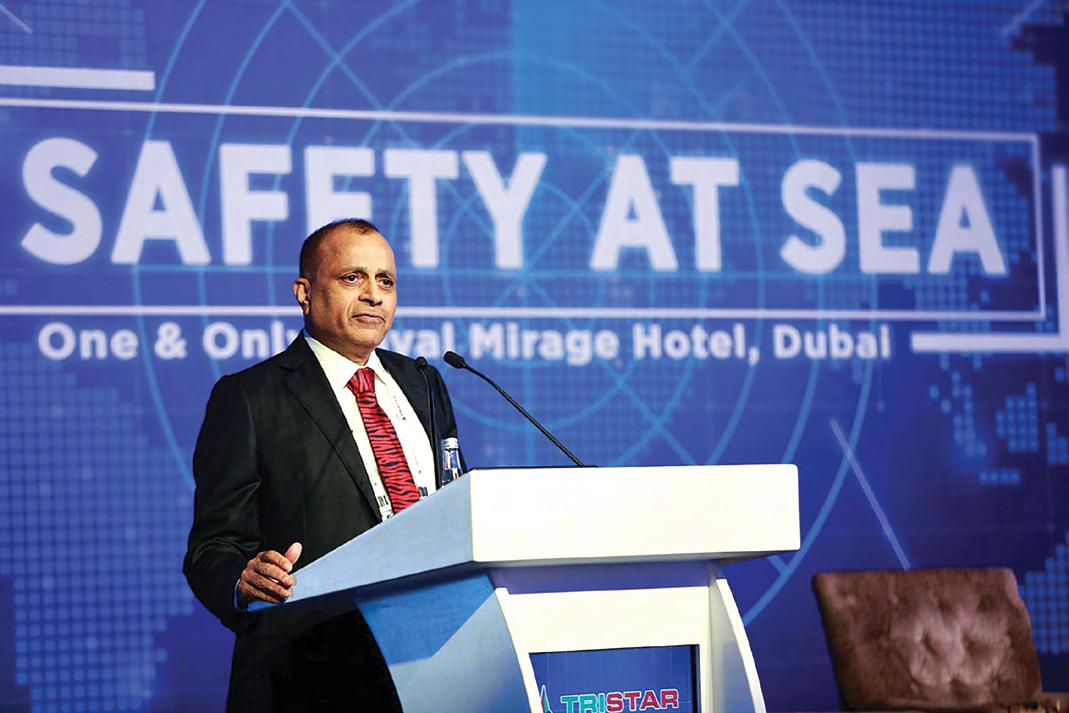
“Companies all over the world are in crisis mode and no one can predict with any degree of confidence how 2021 is going to look like. However, new experiences as a result of the pandemic such as working from home or Zoom calls are here to stay
and will enable one to build resilience in businesses going forward.
I believe that best in class companies will look for opportunities while average companies will most likely focus on the crisis itself. There will be an inevitable
“Preparing for a potential rebound, understanding how to take advantage in the event of a recession, and reimagining the post-crisis future of logistics opportunities, will be needed to stay ahead of the rest going forward.”
rebound in demand post the crisis, and there is an opportunity for companies to innovate and be prepared for the new opportunities that will evolve out of this crisis.
Reacting to the immediate issues presented by a crisis is necessary, however it is not sufficient. Preparing for a potential rebound, understanding how to take advantage in the event of a recession, and reimagining the post-crisis future of logistics opportunities, will be needed to stay ahead of the rest going forward.
Therefore, we will see logistics companies developing new digital capabilities as this will definitely be needed, to keep up the pace with fast
moving technologies in 2021 and beyond. The use of 5G and AI already appears to have an impact on a wide range of industries and the use of technological applications are likely to create new opportunities in the logistics industry.
Technologies such as smart ships, Blockchain, internet of things and robot process automation will enable transparency, flexibility and remove oversight, which will be essential in the post pandemic world. Due to the uncertainties surrounding the pandemic, logistics companies need to move to industry 4.0 to adapt from a ‘just in time, to just in case model’.”
(UAE)
“This year was challenging for all businesses. COVID-19 and the economic fallout have highlighted the weak points in companies’ strategy, inventory, marketing, and transportation. If 2020 has taught us anything, it is how to be agile. Companies are learning to adapt and innovate to meet these new challenges. Anticipating future trends in the face of so much uncertainty is more vital than ever, and some future trends according to me are as follows:
Companies are looking towards better digital integrations of their supply chain. Now, trade flows are at the highest from across the globe - thanks to digitization. The transition of offline to online and larger inventory levels held by e-commerce players in the region, will speed up the warehousing demand further.
Due to a sudden surge in technological advancements, information can now be easily accessed by customers, resulting in higher expectations from companies within the logistics industry. Customers are now turning towards companies with a digital footprint and logistics companies have to embrace this digital change immediately or risk going out of business.
Premier Logistics primary belief has always been of collaboration and we feel that it is the perfect time for an asset-light approach and collaboration-heavy approach. Companies with heavy assets on their balance sheet will face difficulties for the next few years to recoup from the costs sustained during the pandemic.
We all know that several sectors will continue to grow amidst the new normal - sec-

tors such as e-commerce, last mile delivery, warehousing services for basic needs and retail goods will definitely see continuous growth. Therefore, it is time to collaborate and synergize with
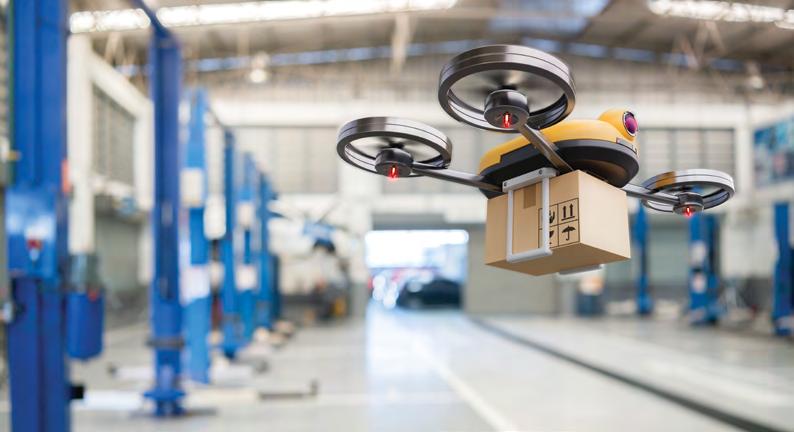
organizations that can utilize each other’s strengths.
Risk management will be of utmost priority for all logistics companies. While shippers and 3PL’s are learning to adapt and innovate, they will also need to plan their readiness for any contingencies and business continuity as areas in most need of strengthening postpandemic.”
“Customers are now turning towards companies with a digital footprint and logistics companies have to embrace this digital change immediately or risk going out of business.”
Emirates SkyCargo transports first batch of Pfizer-BioNTech COVID-19 vaccines for Dubai Health Authority
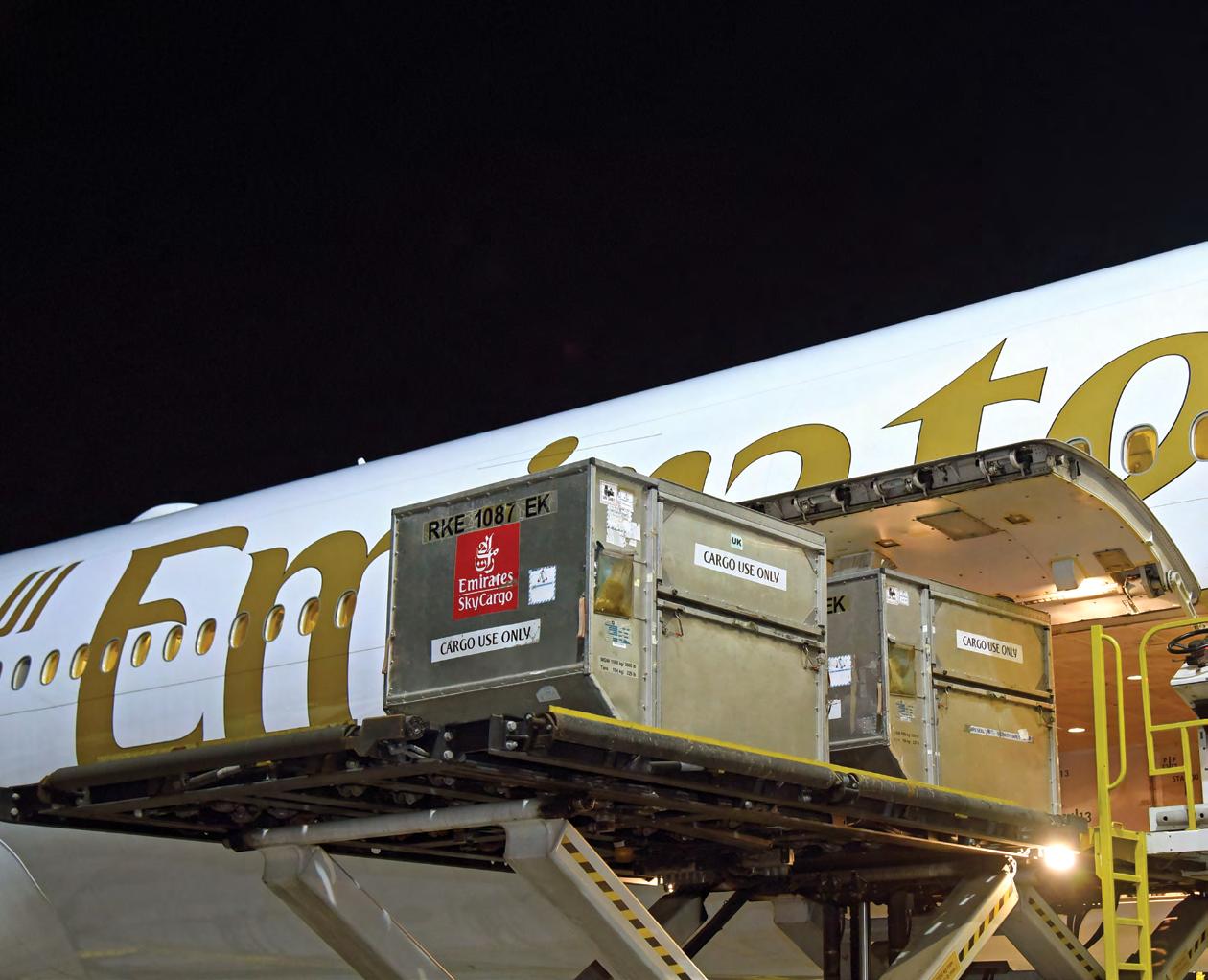
Emirates SkyCargo has notched yet another milestone by flying in COVID-19 vaccines manufactured by Pfizer-BioNTech to the UAE for the first time for the Dubai Health Authority (DHA). The vaccines were transported from Brussels on Emirates flight EK 182 on 22 December 2020, arriving at Dubai International Airport (DXB) at 22.15 local time.
HH Sheikh Ahmed bin Saeed Al Maktoum, Chairman and Chief Execu-
tive, Emirates Group said: “Emirates is proud to be transporting the first batch of Pfizer vaccines for COVID-19 into the UAE for the Dubai Health Authority. Our healthcare ecosystem has played an absolutely critical role in every step of the fight against COVID-19. I would like to thank everyone who has worked unceasingly over the last year to protect the lives of those most vulnerable against the disease. In recognition of their immense contribution for the wellbeing
of everyone in the UAE, it has been our honour to transport these vaccines free of charge on our flight.” Nabil Sultan, Emirates Divisional Senior Vice President, Cargo said: “At Emirates SkyCargo we are doing our part to join Dubai’s efforts to fight the COVID-19 pandemic. Thanks to the effective management of the pandemic by Dubai’s visionary leadership, the city has retained its position as a global logistical hub for connecting vital cargo including PPE, medical supplies, vac-
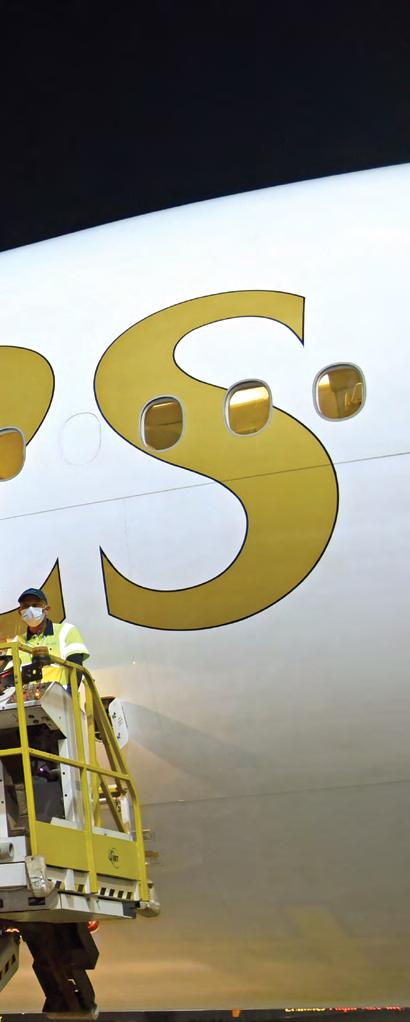
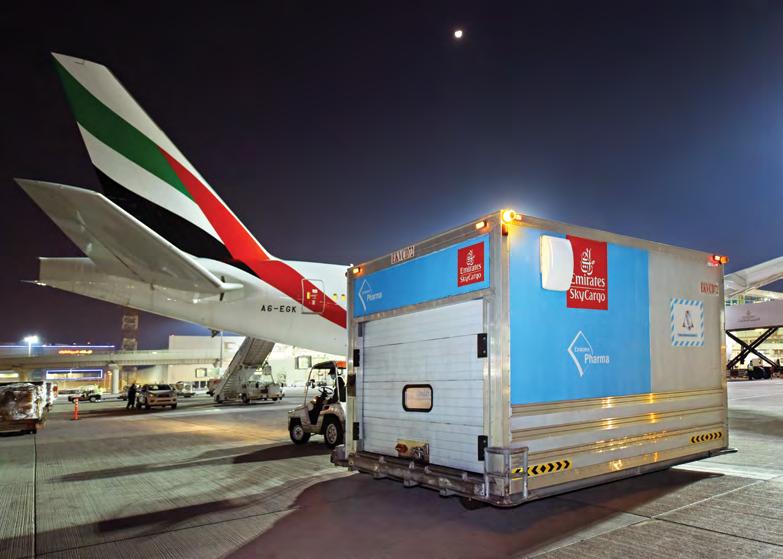
cines, food and other essential items. Emirates SkyCargo has set up the world’s largest airside hub dedicated to distributing COVID-19 vaccines and we stand ready to support not just Dubai, but countries around the world, including markets with limited cool chain infrastructure with our advanced capabilities. By transporting COVID-19 vaccines across our extensive network, we look forward to helping people around the world get back on their feet after the devastating impact of the pandemic.”
On arrival at DXB, the containers with the vaccines were unloaded on priority from the aircraft and then taken to Emirates SkyCargo’s dedicated pharma facility Emirates SkyPharma to await clearance for delivery.
Emirates SkyCargo is no stranger to transporting vaccines and other temperature sensitive pharmaceutical cargo. The carrier has more than two decades experience in transporting pharmaceuticals on its aircraft and has set up state of the art EU GDP certified facilities dedicated for storing and handling pharma cargo in Dubai. Emirates SkyCargo has also established a global Pharma Corridors programme working with ground handlers and local airports at major pharma origin and destination stations for enhanced cool chain protection. The current pharma network covers over 30 cities across the world including Brussels.
More recently, Emirates SkyCargo has set up the world’s largest dedicated airside storage and distribution hub for COVID-19 vaccines in Dubai with the capacity to store up to an estimated 10 million doses of vaccine at the 2-8C temperature
range at any one point of time. With its advanced infrastructure, extensive network and modern all wide-body aircraft fleet, Emirates SkyCargo can transport COVID-19 vaccines rapidly and securely from manufacturing locations to destinations across six continents. Emirates SkyCargo has already commenced distribution of COVID-19 vaccines from a range of manufacturers and geographies.
“EMIRATES SKYCARGO HAS SET UP THE WORLD’S LARGEST AIRSIDE HUB DEDICATED TO DISTRIBUTING COVID-19 VACCINES AND WE STAND READY TO SUPPORT NOT JUST DUBAI, BUT COUNTRIES AROUND THE WORLD, INCLUDING MARKETS WITH LIMITED COOL CHAIN INFRASTRUCTURE WITH OUR ADVANCED CAPABILITIES.”
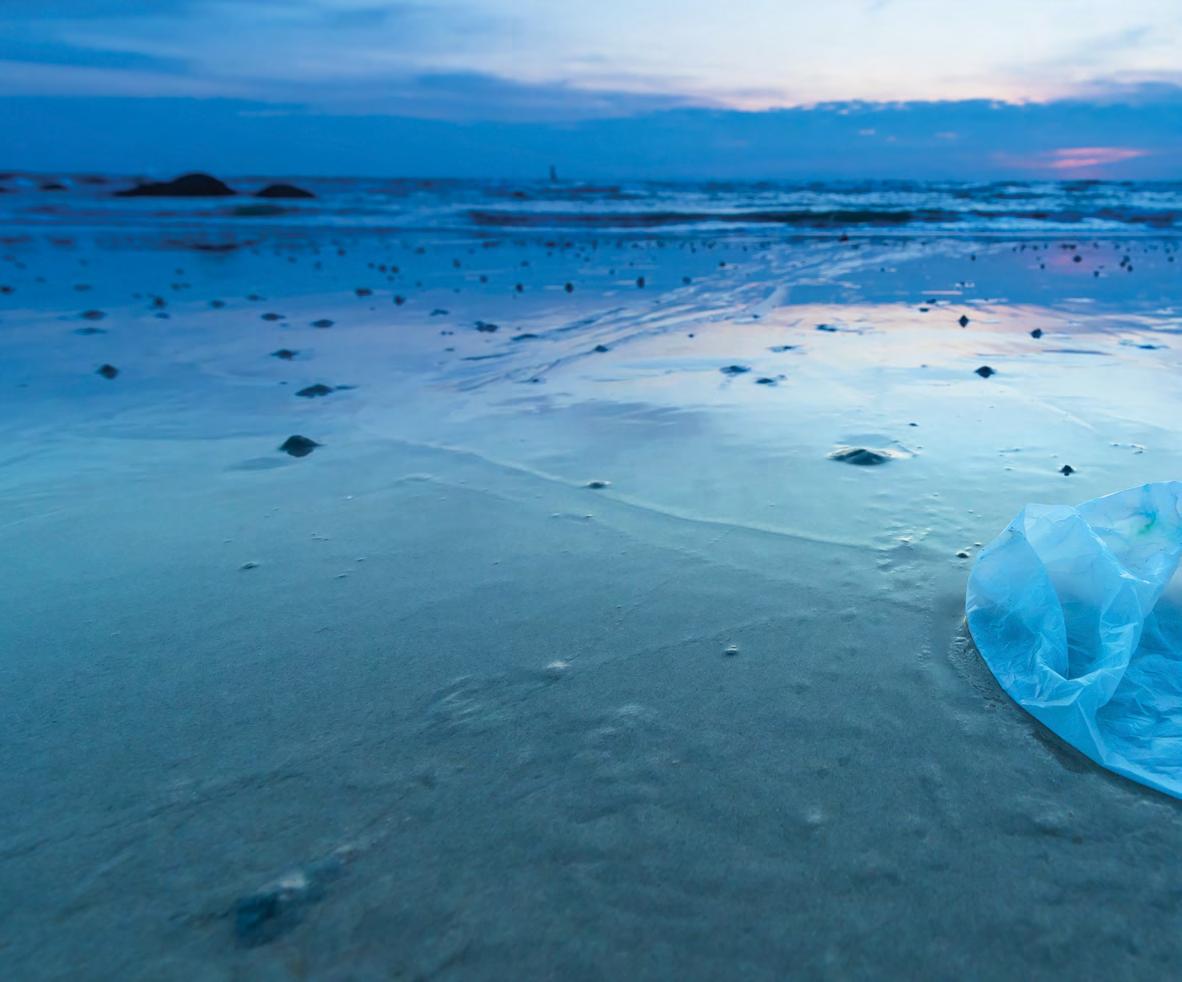
Azraq, a volunteer-run not-for-profit entity, is proud to be celebrating its third anniversary. The grassroots marine conservation organisation was founded in September 2017, and has been on the front lines of ocean conservation in the United Arab Emirates with exceptional ground work and education of the community. The platform was actively involved in beach and ocean clean ups and mangrove tree planting days for the past year and hopes to continue the fight for cleaner oceans.
Founder Natalie Banks left her role as a marine conservationist and scuba diving instructor in Australia in 2016 to come to UAE After four months of attempting to secure a position in marine conservation, Natalie decided to take the bull by the horns and start an organisation herself from scratch. With the guidance of
the Community Development Authority, Natalie formed and developed Azraq, an organisation that educates, motivates and essentially gets people to indulge in a more sustainable form of living for the betterment of our azure treasure.
The Arabic translation of blue, Azraq strives for a cleaner, healthier ecosystem by putting an end to the destruction of habitat and slaughter of wildlife in the oceans. The organisation understands the need to include people from all spheres of life to participate in the journey towards creating a better world. The inclusive platform has a variety of partnerships, across the board, to foster sustainable practices to help maintain the harmony of marine life.
Through its extensive volunteer-led programs and education initiatives, Azraq is able to cultivate young minds to become leaders

and changemakers in the field of marine conservation, as well as generally inspiring them to be conscious consumers. The organi sation’s partnership with schools and universities led to the crea tion of a youth ambassadors program. The Ocean Youth Ambas sador role is for students aged between ten and 18 years residing in the UAE who are passionate about the oceans and in making positive sustainable changes in their community. The committee has been successful in actioning their first campaign - Reef Res cue - a program to educate and raise awareness about the danger plaguing coral reefs and its effects on the ocean.
Azraq dreams of clean azure waters, free of dirty, non-biodegradable plastic waste, in which a thriving marine life is present. The organisation takes into consideration the various corporate sectors involved that can make a huge impact in conserving
aquatic life. In order to highlight the issue of plastic waste, and hopefully get people to think twice about their usage, the organisation launched its #UselessUtensils campaign, in partnership with Freedom Pizza, Lush Middle East, Carluccio’s and Beitfann Studio (Sustainable City). The campaign led to the collection of approximately 60kg and over 30,000 plastic utensils in six weeks!
The non-profit has inspired a number of companies across the country to promote sustainable business practices by actively partnering up with them for a range of initiatives. One such campaign - #STOPSUCKING, in collaboration with Freedom Pizza, sought to reduce single use plastic straws from food outlets in the UAE. The campaign drew attention to the increasing amount of plastic waste in the oceans resulting in the endangerment of its diverse marine life. Single use plastic has effectively disrupted the ecosystem and the accumulation of the substance can cause irreversible negative impact.
Besides campaigns such as planting mangroves, beach clean up, and more, Azraq educates the residents on protecting the specific organisms of the country. The organisation regularly disseminates information regarding the country’s reef diversity and its protection, various species of marine life, etc to help acknowledge and understand the nuanced lives present in the ecosystem. With such a focused agenda and praiseworthy groundwork, Azraq aims to ultimately create a cohesive community that stands together to support and nurture the environment they live in.
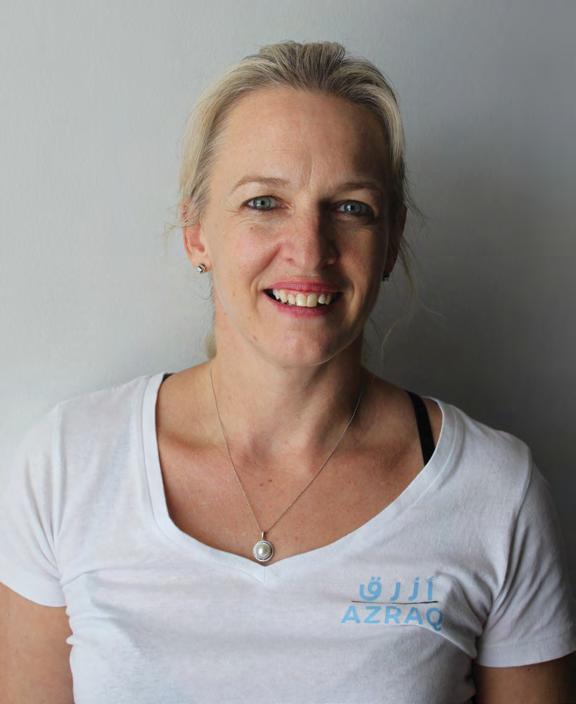
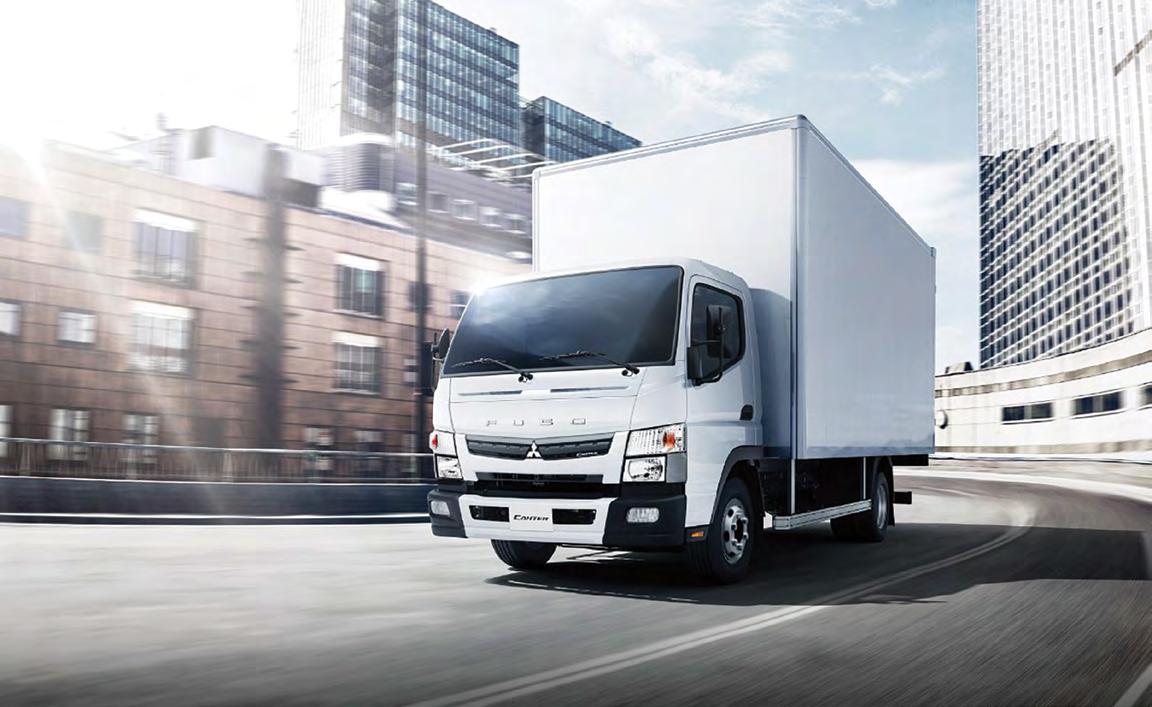
Since the introduction of Canter in 1963, more than 3.5 million Canters have been produced making it the bestselling truck model at Daimler Trucks. Canter is highly popular in the region and in the light-duty truck segment; it has remained prominent in the market for more than 57 years and across 8 different model generations.
The new FUSO Canter Euro 5 offers a wide range of variants. There are two different cab widths available: the streamlined standard cabin, which is
just 1,695 mm wide and suitable for use in restricted spaces; and the comfortable wide cabin, measuring 1,995 mm in width. In addition, the wide cabin is also available with a crew cabin optionfitting up to seven persons.
With two different axle configurations in 4x2 and 4x4 variants with a wide range of permissible gross vehicle weight spectrum from 5.7 tons to 8.55 tons, the new Fuso Canter range covers all the key segments for light-duty trucks.
Currently the range is available with 5-speed manual transmission. A 6-speed automated manual transmission (AMT) will soon be launched for the new Canter range in the 6.5 tons weight variant.
The robust and durable design, Euro 5 emission norm, low fuel consumption, higher payload are just a few of the many features contributing to the new Canter’s almost legendary overall economy. The new generation is cleaner and more fuel-efficient than previous models and provides the highest eco-friendliness. It offers maximum efficiency with reduced fuel consumption compared to previous generations.
Several measures have been implemented into the newly designed common-rail 4P10 engine with 2,998ccm 2,998cc which is available in two engine outputs with 96 kW (130 ps) and 110 kW (150 ps). Both engines offer a flat torque curve with 300Nm and 370Nm at 1,300rpm & 1,320rpm respectively. In all models, the Euro 5 emission norm is achieved through an EGR (Exhaust Gas Recirculation) system and DPF (Diesel Particulate Filter) which is con-
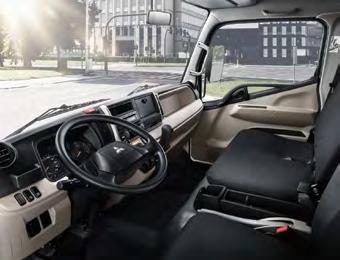
figured for the vehicle’s lifetime and is maintenance-free, eliminating the need to be cleaned or replaced.
Using a higher torque engine with lower RPM ensures lesser strain on the engine and an overall longer engine life. With the newly available Euro 5 emission, less CO2 and NOx are emitted resulting in a reduced carbon footprint. The new Canter over-fulfils the local emission norm required in the UAE.
The other special features of the new FUSO Canter Euro 5 range include the variant with manually selectable all-wheel drive with a permissible gross vehicle weight of up to 6.0 tons, a 1,995mm comfortable wide cabin and an engine output of 110 kW (150 ps). The all-wheel drive can be engaged
whenever required; the Canter 4x4 includes the standard-fit engageable reduction gear. This reduces the maximum speed in the respective gears by a factor of 1.987 and also increases traction by this amount. The crew cabin option will also be available on the 4x4 model.
The new FUSO Canter Euro 5 range offers a number of new safety systems which includes ABS (Antilock Braking System), EBD (Electronic Brake Force Distribution), BOS (Brake Override System), driver and co-driver airbags, tubeless tyres and more. The standard braking system is equipped with disc brakes on both axles, which guarantees superior braking performance & heat dissipation under continuous heavy braking.
The Canter with the highest GVW & 4x4 configurations are equipped with drum brakes at the rear axle on both axles. The standard Exhaust Brake System (EBS) valve is fitted on the turbo charger outlet. This system uses the vehicle exhaust gas to create a backpressure to slow down the engine, enabling vehicle stability. This results in reduced stress on service brakes when driving downhill and therefore a reduction in maintenance costs of the vehicle.
Al Habtoor Motors has always focused on building customer confidence by providing FUSO customers not only the best choice of vehicles through its 8 showrooms network, but also high quality after sales support through its 11 Parts Outlets and 7 Service Centers spread across the UAE. For the better convenience of the customers, there are two Mobile Service Units as well.
Add to the excellent after sales support, Al Habtoor Motors has also taken care to provide Drivers & Technicians of Fleet customers extensive Customer Training at its Technical Training Center in DIC. Al Habtoor Motors also has a Central Parts Distribution Warehouse in DIC along with 2 PDI & Logistics Facilities to ensure uninterrupted supply of vehicles as well as spare parts.
Al Habtoor Motors has always focused on building customer confidence by providing FUSO customers not only the best choice of vehicles through its 8 showrooms network, but also high quality after sales support through its 11 Parts Outlets and 7 Service Centers spread across the UAE.
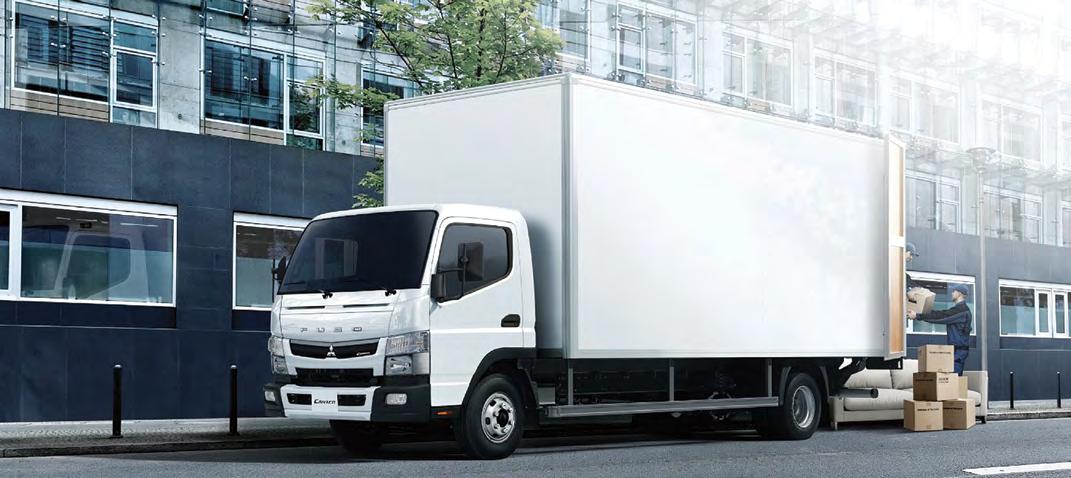
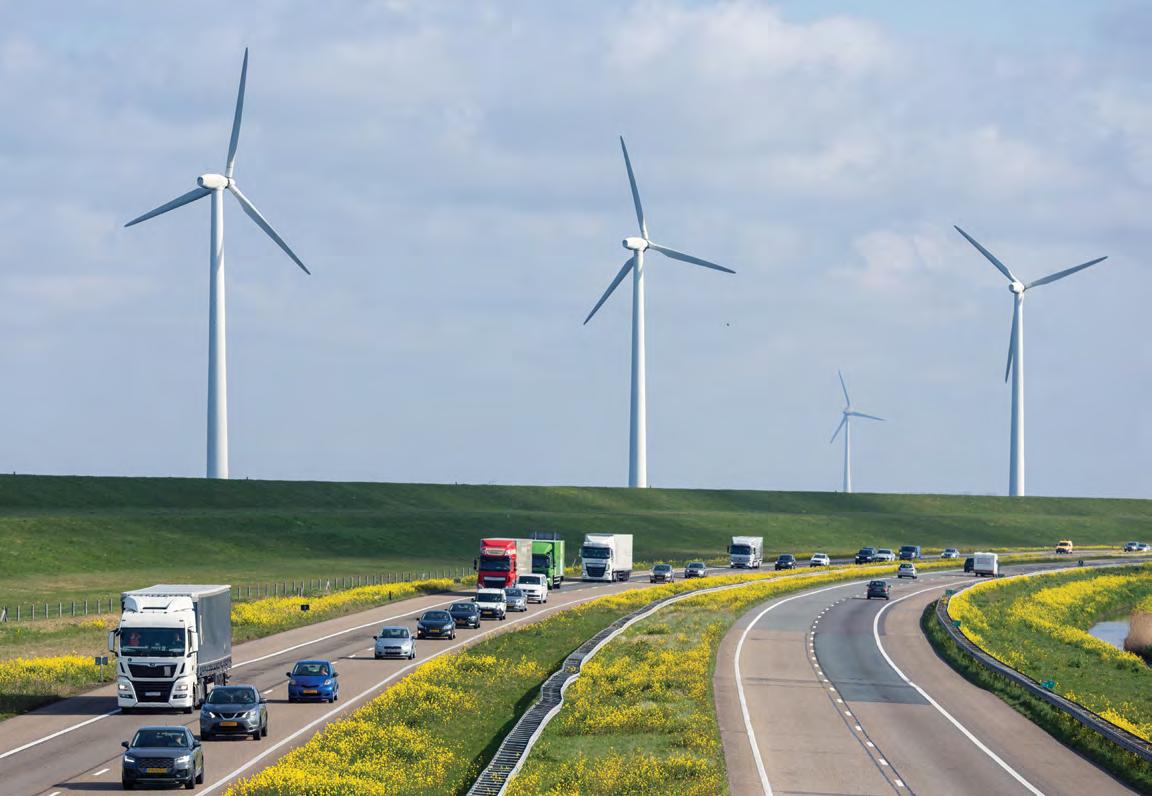
Ford research reveals how emerging technologies such as dynamic geofencing and blockchain can combine with hybrid-electric vehicles to help improve air quality in cities
Pioneering research by Ford has shown how emerging technologies such as blockchain and dynamic geofencing can complement plug-in hybrid-electric vehicles (PHEVs) to help contribute to cleaner air in urban centres, offering benefits for cities, citizens and operators.
The findings follow an extensive threeyear study into the potential for commercial PHEVs to help cities solve air quality challenges. More than 400,000 kilometres of data was collected during the programme with dozens of Ford Transit and Tourneo PHEVs deployed to a variety of municipal and commercial fleets in London; Cologne, Germany; and
Valencia, Spain. Among the learnings was how geofencing and blockchain technology can complement PHEVs to further improve urban air quality by triggering zero-emission running based upon local air quality. The trial also featured an innovative PHEV van fitted with an electric refrigeration unit powered independently of the vehicle’s batteries, showcasing the operational flexibility and range of use cases supported by the platform.
“Our research has shown how plug-in hybrid vehicles, and emerging connected technologies such as dynamic geofencing and blockchain, can play a major role in transforming cities,” said Mark Harvey, director, enterprise connectivity, Ford of Europe. “With their zero-emission capability with no range anxiety, PHEVs offer a practical, flexible alternative to diesel,
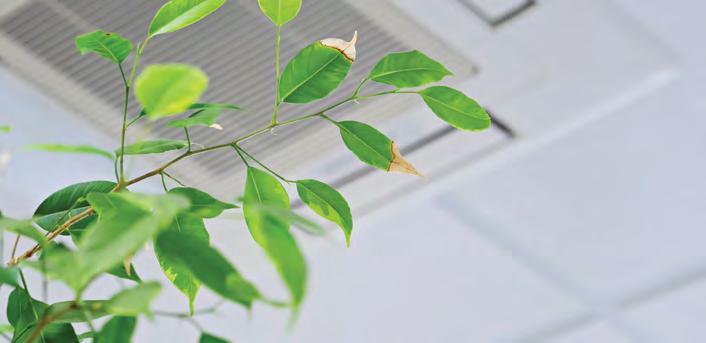
“OUR PIONEERING RESEARCH DEMONSTRATES THAT OPERATORS OF ALL TYPES REALLY CAN GET THE BEST OF BOTH WORLDS WITH PHEV TECHNOLOGY, ELECTRIFYING FLEETS FOR IMPROVED SUSTAINABILITY WITHOUT COMPROMISING ON PRODUCTIVITY.”
making them ideal as general-purpose vehicles for work in and around cities.”
The Ford Transit Custom PHEV was the International Van of the Year 2020 and, along with the Tourneo Custom PHEV, is part of Ford’s global move towards electrification. The company’s extensive range of electrified commercial vehicles in Europe also includes the 48volt mild-hybrid Transit, Transit Custom and Tourneo Custom EcoBlue Hybrid variants, Fiesta Van EcoBoost Hybrid and the fully electric E-Transit arriving in spring 2022.
Low-emission zones are increasingly common in urban centres across Europe. Ford’s geofencing feature, fitted as standard on Ford Transit Custom PHEV, can help cities to maximise air quality benefits where they are most needed. With geofencing, the vehicle’s zero-emission electric-drive mode can be activated automatically whenever it enters a low emission zone, without intervention from the driver.
The Cologne municipal fleet trial took this one step further, showing how blockchain technology can complement geofencing to further enhance efforts to improve air quality. The time a trial vehicle entered or left a geofenced zone was recorded into a blockchain – a secure and transparent digital ledger that creates permanent time stamped records which are saved on multiple computers – ensuring ‘green miles’ driven could be safely stored and potentially shared among relevant parties such as city authorities and fleet owners.
The trial also tested dynamic geofencing: instead of a fixed low-emission zone triggering the vehicles’ zero-emission modes, Ford’s dynamic geofencing pilot constantly adjusted the boundaries based on air quality data captured by Climacell
and the City of Cologne. As Ford’s connected PHEVs entered these constantly fluctuating zones, they automatically switched to low-emission mode – taking the decision making out of drivers’ hands, improving air quality for citizens and helping vehicles maintain compliance with local restrictions.
Both the Cologne and Valencia studies proved the value of connecting vehicles and cities to help reduce air pollution and develop low-emission zone compliance; of the 218,300 km covered by the 20 vehicles in Cologne and Valencia, almost half (105,600 km) were driven on purely electric power, rising to more than 70 per cent in the Cologne geofenced zones.
“Our pioneering research demonstrates that operators of all types really can get the best of both worlds with PHEV technology, electrifying fleets for improved sustainability without compromising on productivity,” said Harvey. “With our latest studies in Cologne and Valencia, we’ve shown the additional sustainability and compliance benefits that connected technologies such as geofencing and blockchain can bring to cities, citizens and operators.”
The small- and medium-sized businesses taking part in the Valencia study included delivery, cleaning, and private security fleets, with irregular itineraries that sometimes took them outside of the city boundaries. For these longer journeys,
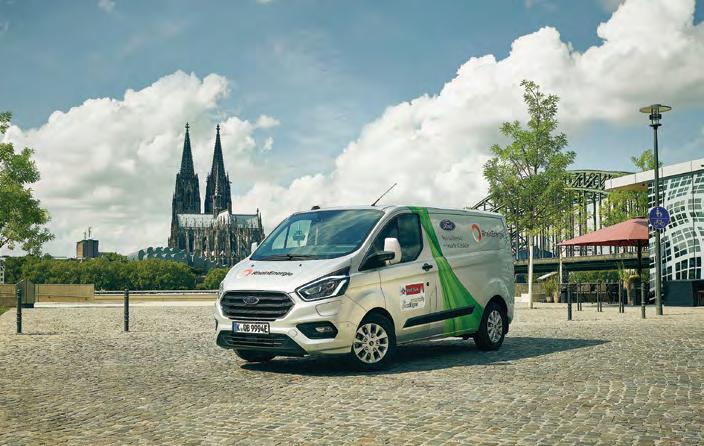
fleets were able to benefit from the PHEV’s onboard 1.0-litre EcoBoost petrol engine which can charge the battery on demand and extend the vehicle’s range to more than 500 km (310 miles) WLTP. 2
The Valencia fleet also included an innovative PHEV refrigerated van fitted with a Zanotti Invisible electrically powered chiller unit. Rather than using a generator to power the refrigeration system, Ford – along with Zanotti, a leader in transport refrigeration and part of the Daikin Group, and local transport refrigeration specialists, Mebauto – created an electric solution that cools the load compartment in 18 minutes and offers true zero-emission driving when the van is operating in electric-only mode.
The chilled vehicle successfully coped with intensive work schedules through Spain’s hot summer, delivering meals, perishable goods and pharmaceutical products from urban supermarkets to vulnerable people sheltering from Covid-19 at home.
The refrigerated van achieved 82 per cent of its mileage in electric-drive mode, rising to 90 per cent in the Valencia geofenced area. Drivers could top up the van’s battery while reloading and fully recharge it each night. When required, the range extender enabled trips of up to 143 km between supermarkets and customers in the city centre.
The refrigerated conversion elements further increased operating flexibility. The additional fans and cooling systems were packaged under the load floor to minimise aerodynamic impact, optimising range and efficiency – this also helped with access to tight streets, height-restricted car parks and underground loading bays.
The research in Valencia was funded in part by the Valencia Regional Government with the aim of working with small and medium businesses from different industries to identify how they could adapt their operations to support and benefit from electrification. Along with a further
130 connected commercial vehicles, the Transit PHEVs collected important road traffic data for the Valencia Smart City platform to further understanding of how vehicle connectivity can help cities become more efficient and sustainable.
The work in Cologne and Valencia concludes a successful research programme that began in London in 2018. Supported by the U.K. Government-funded Advanced Propulsion Centre and Transport for London, participants including Addison Lee Group, British Gas, Metropolitan Police and Sky helped to show how PHEVs could offer a compelling solution for commercial vehicle owners in cities with low-emission zones.
THE SMALL- AND MEDIUM-SIZED BUSINESSES TAKING PART IN THE VALENCIA STUDY INCLUDED DELIVERY, CLEANING, AND PRIVATE SECURITY FLEETS, WITH IRREGULAR ITINERARIES THAT SOMETIMES TOOK THEM OUTSIDE OF THE CITY BOUNDARIES.

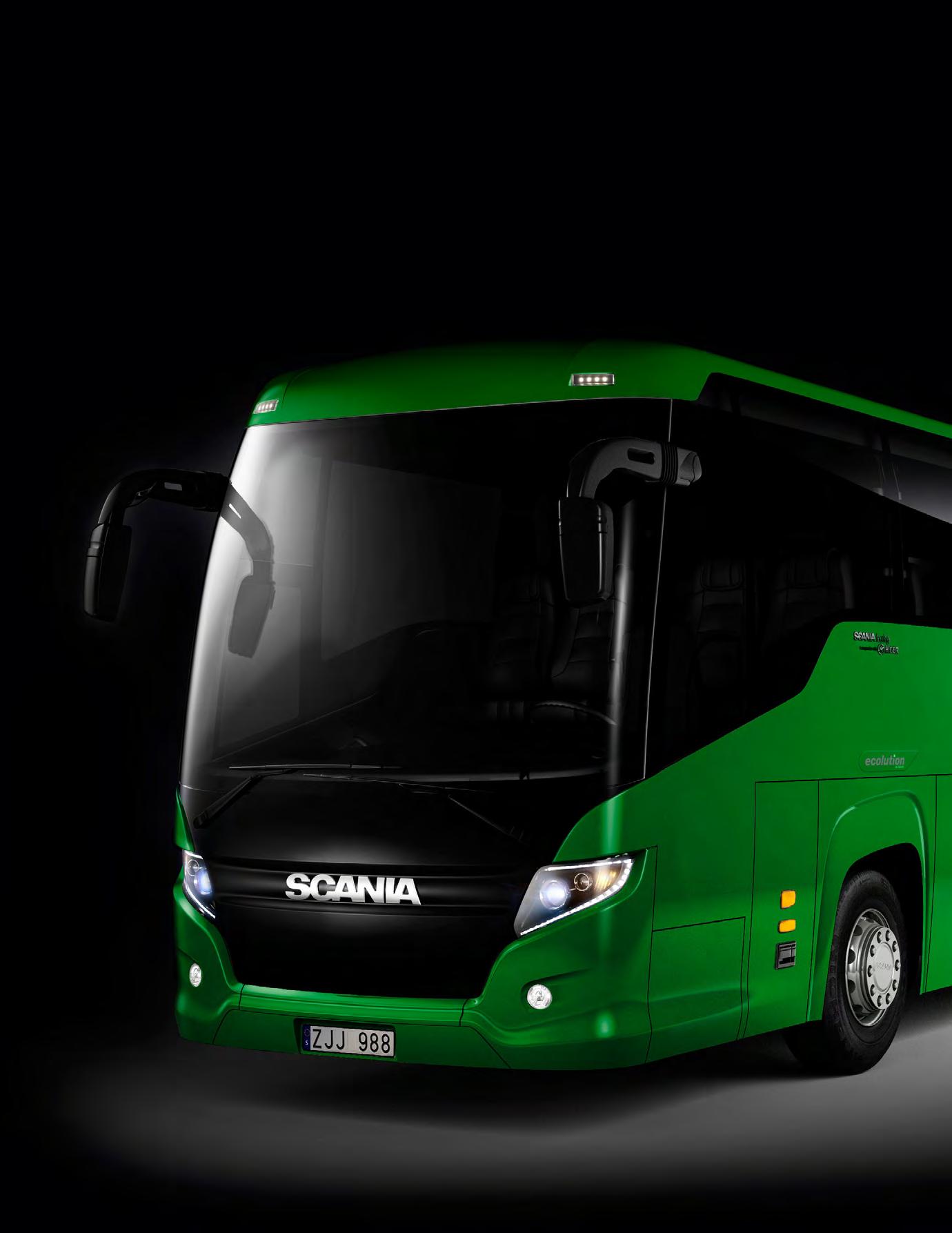
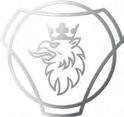
The Scania Touring is a coach designed to meet your needs for occasional service and regular service over long distances. You will enjoy full support from a single point of contact since all parts, maintenance and repairs are backed by Scania’s comprehensive

global service work. The possibility of fast deliveries gives your business plenty of flexibility. If you’re focused on good total operating economy, this coach is destined to be a profit source for years to come.

Organised by Dubai Chamber , 360 Dialogue Series sheds light on key trends and technologies reshaping supply chains during Covid-19
Businesses in the UAE are adapting quickly to new trends and technologies that are accelerating change within global logistics, industry experts said during a recent virtual panel discussion hosted by Dubai Chamber of Commerce and Industry.
The panel was organised as part of the 360 Dialogue Series and joined by Mahmood Al Bastaki, Chief Operating Officer of DT World; Harj Dhaliwal Managing Director Middle East & India Virgin Hyperloop; and Yasir Jamal VP Supply Chain, North Africa & Middle East, Unilever, and attended by over 100 participants.
In his welcome remarks, Hassan Al Hashemi, Vice President of International Relations at Dubai Chamber of Commerce and Industry, explained that the virtual event comes at a time when companies from around the world are leveraging Dubai’s strategic geographic position and world-class logistics infrastructure to reposition their businesses as they prepare for a post-Covid recovery.
Despite the unprecedented challenges seen this year in the wake of Covid-19, Dubai has found itself in a strong position, given its strong focus on embracing digital transformation and investing in logistics infrastructure, Al Hashemi said. He also highlighted the important role played Dubai Chamber in ensuring business continuity and improving ease of doing business during Covid-19 through its wide
range of e-services and policy advocacy efforts. The panellists outlined a number of key trends seen within the UAE logistics sector, including the seamless shift to digital services, the transition from land to sea freight and the adoption of advanced technologies, which they said were crucial in helping industry players navigate new challenges.
The pandemic has proven that adaptive and agile supply chains are a competitive edge for successful businesses, the panellists noted, identifying last-mile delivery, increased integration between ports and free zones, closer collaboration among logistics and transportation players and a stronger prevalence of AI and robotics in production facilities as key trends that will reshape the future of the sector.
Having recently reached a milestone after successfully completing its first test drive with human passengers, Virgin Hyperloop’s new technology is expected to change the dynamics of passenger and cargo transportation in the future, the panellists added.
